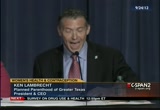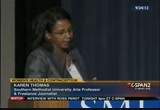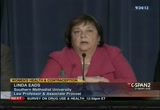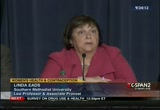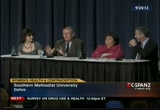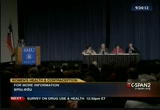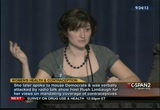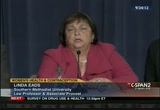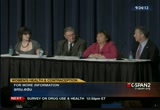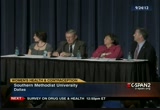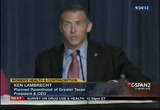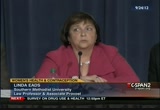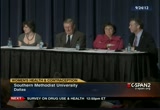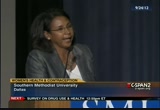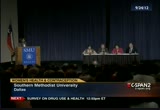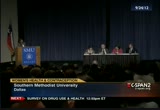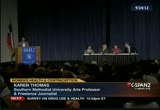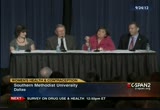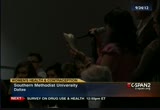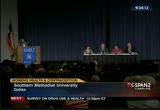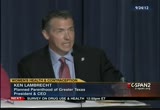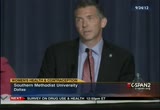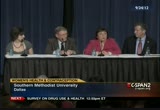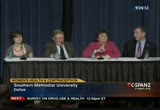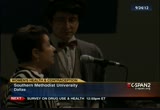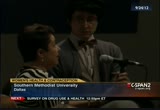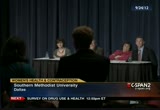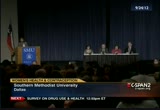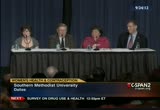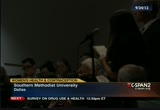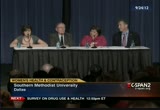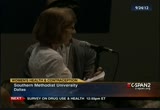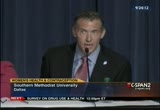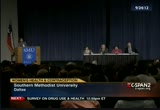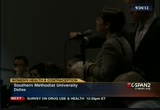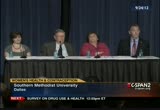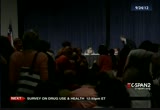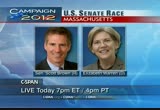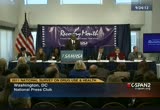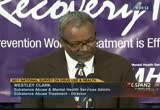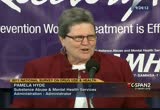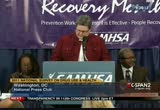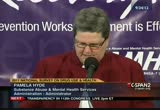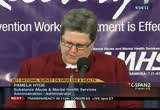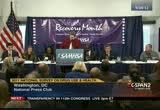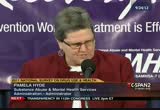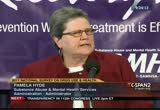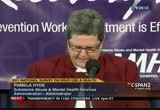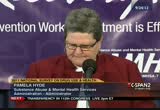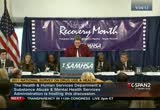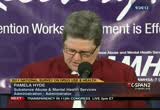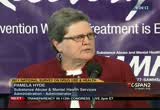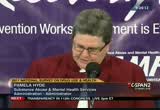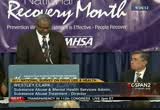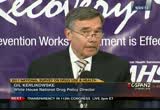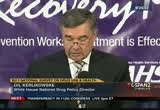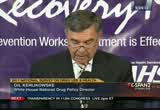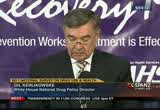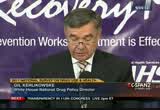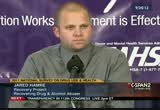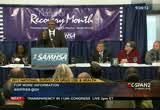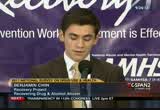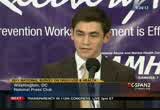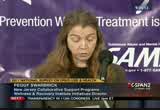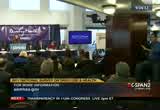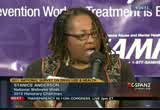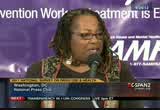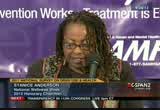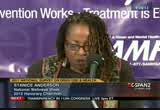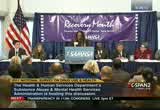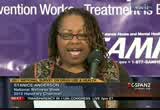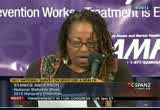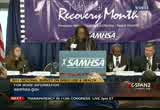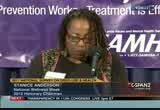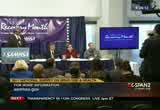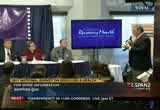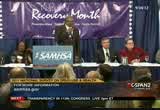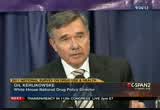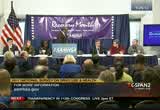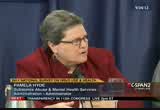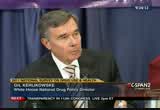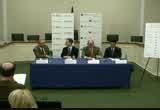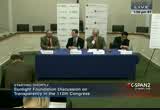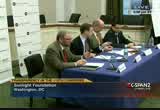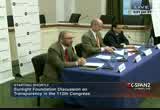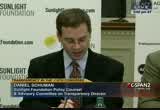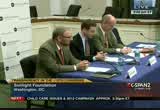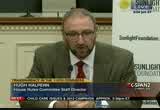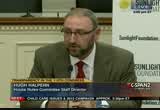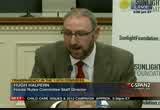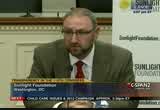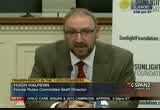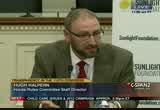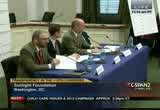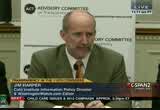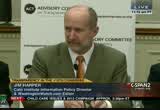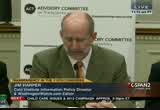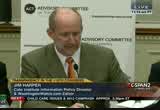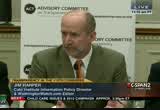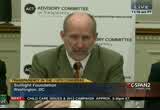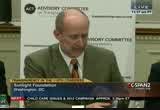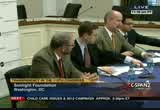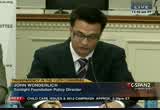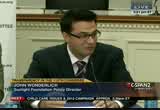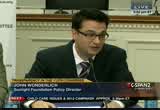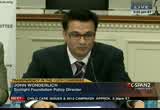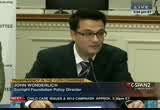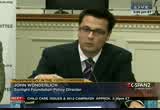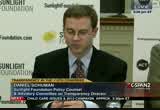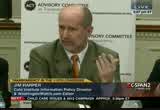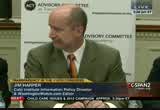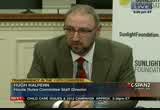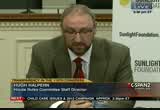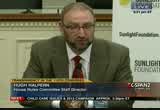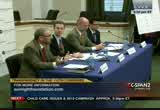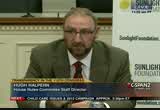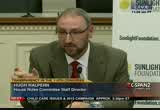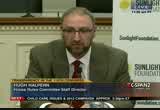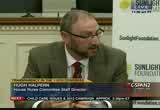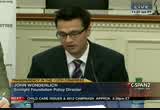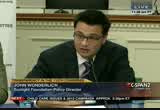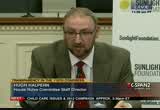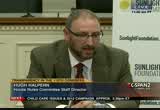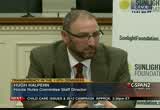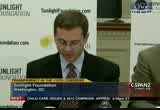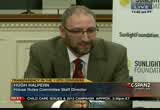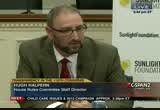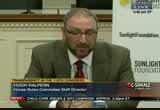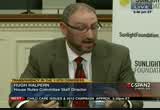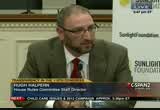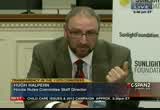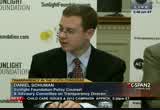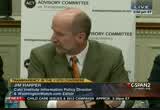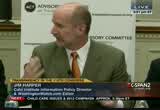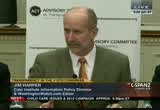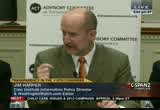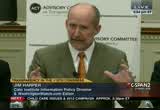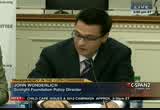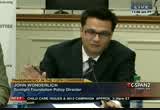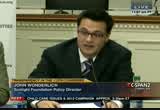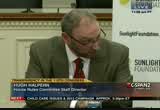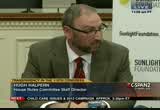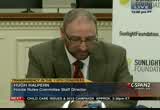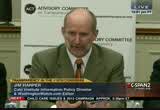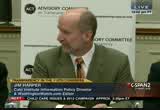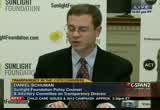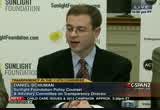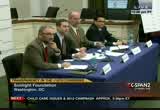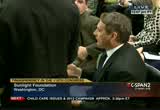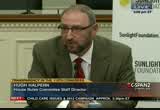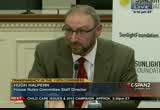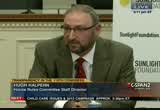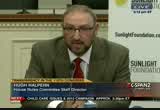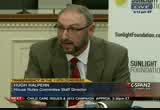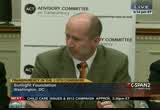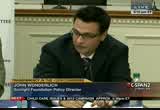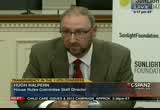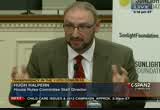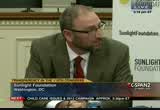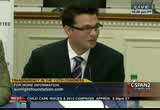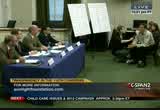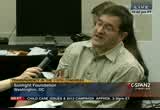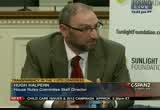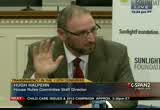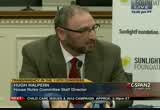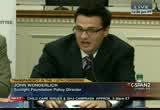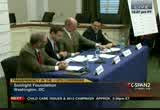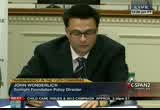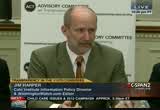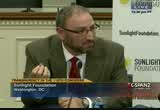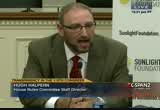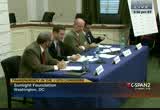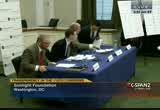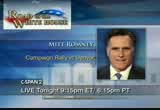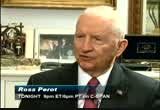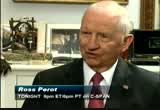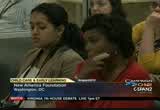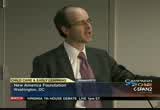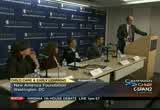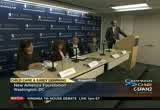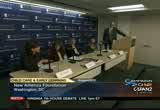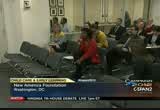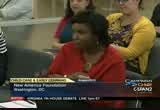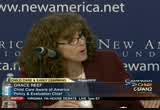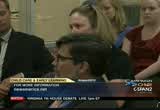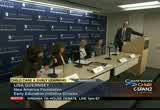tv U.S. Senate CSPAN October 1, 2012 12:00pm-5:00pm EDT
12:00 pm
a patient of ours is in her 40's, has excellent health insurance for most of her adult life. when she divorced two years ago, that changed. she no longer have health insurance. in her words, planned parenthood made it possible, realistic and affordable for me to maintain my health and wellness. thank god for planned parenthood [applause] ..
12:01 pm
[laughter] >> well, when i take the white house -- [laughter] [applause] i think that we shouldn't look at it in terms where the government begins and ends. i think that we are saddled with an insurance system in this country because of what happened after world war ii, an insurance system to provide health care. other countries don't have that to the extent we do, even countries that do allow it. so we have this insurance system, and what the government's, i think, reasonable job is, to make sure that the insurance system allows enough access, um, so that people can be covered within a
12:02 pm
reasonable premium amount. and that's done simply by watchdog and certain regulations. now, the truth is whenever you have the government involved, you have a question of whether they're doing it as cheaply as possible. but that's why we're still using the insurance system. because hopefully now insurance companies -- how many of you got refund check, by the way, from your insurance company, right? because all these years they've been overcharging for administrative costs. um, and so insurance companies now will regulate by what's a reasonable amount of money to charge a provider. there's going to be problems, there's always problems. i mean, as i tell my students in constitutional law, this country is a work in progress. sometimes the government's going to go too far, and we need to rein them in. i'm not in favor of excessive government involvement in my life. um, and sometimes private industry will go too far in terms of wanting to make it all
12:03 pm
about how much profit they make, and we'll rein them in because health care is not something that should be guided solely by the bottom line. so i think the government has a role, and i think we have to keep a catch -- watchdog, citizens' deal on how much of a role we give them. >> i would add to that that birth control access should be a nonpartisan issue. as many of you probably know, president nixon signed title x family planning funding into law. it was a republican value for lesser government intrusion in our lives and good fiscal conservativism. $1 invested saves $4 in unnecessary costs. and as we know today, social ideology is forcing some of our politicians to be more socially conservative than fiscally responsible. because they recognize this is just good public health. >> okay. um, i think, you know -- i'm sorry. go ahead, charles. >> i get a little nervous about some of these responses,
12:04 pm
frankly. that this, again be, is a tension between the government and the individual. and it's, on certain areas -- and i can practically agree with everything said, but not to slittize it. the government has to force big companies not to pollute. the government has a lot of things that the government has to do. so life is, you live again with this kind of tension, to say i can agree on these issues, but be very careful. and where i might disagree is i think the best solution in the united states for health care is a single-payer system. [cheers and applause] i've always said to my opponents
12:05 pm
i never heard anybody when they're getting on an airplane saying get government off my back. [laughter] [applause] >> it does bring us to a really interesting point that many of the lawsuits that have been filed around this regulation have argued things like rather than regulating private insurance, government should just provide contraception directly through taxpayer funding which is a, in some respects, less conservative position than the one we were at, and yet the lawsuits are filed by conservative organizations. um, but i wanted to clarify one thing which i think speaks to what charlie was just saying. when we discussed earlier the religious freedom restoration act which was the piece of legislation that addressed the supreme court case that we discussed, the act says that if there is a compelling enough interest, then it's appropriate for the government to regulate in that way. so the question really comes to whether, frankly, the argument that i made or that ken made is
12:06 pm
a compelling enough interest. and if it is, then this is a regulation that stands. so we don't want anyone to go away thinking that the regulation is unconstitutional or is a violation of a federal statute. it's not. >> yet. [laughter] >> there are, there are some cases that have not yet been decided, but i feel that they're going to turn out in the way that i described. >> probably. >> yeah. [laughter] >> [inaudible] >> we've talked a little bit about where there is room or for compromise on some of of these issues, but what types of things do you think are negotiable? what can we reach sort of a happy medium on some of these issues? >> hmm. [laughter] >> well, i believe that -- i can't speak to either extreme of either wing of ideology, but i think in the great middle, i think most americans do not want
12:07 pm
government involved in our decisions, family decisions. i think that whether today want to pay taxpayer dollars for my birth control, there would be disagreement about that. although many people would be fine with that given the costs of not having birth control. but i think in terms of having the government tell us whether we can use contraception, whether or not we can use our own premiums to pay for contraception, i think most americans would agree with that. in fact, a huge -- when you ask most americans whether they are in favor of having planned parenthood kinds of facilities available, huge majorities say, yes. this is something that sandra said about the media not being very careful. i mean, it is so easety to write -- easy to write a media story about whether or not you
12:08 pm
want your hard earned dollars to go for contraception, but most americans when they are asked to think about the process as a whole are in favor of some kind of world in which we want children, we have children we want and we can afford. and i think that's a standard value that we can all agree on. >> i would actually reframe to be less about having our public policy be guided by compromise and more about having it be guided by science and by -- [applause] by accurate public policy analysis, by studies that show things like what are the rewards that are reaped from investment in public funding of contraception or in having everyone be insured as a society and what as a society do we gain from that, what is the consequences if we don't? it's been very disappointing to
12:09 pm
see the ways in which over the last few years science has really been pushed out of so much of our legislative process. there are bills that have been enacted across the country requiring medical providers to give statements to women who are coming for services, frequently abortion services, that are based on untrue science. and that's a scary moment regardless of how you feel about abortion and what your personal or legal beliefs are about that. to require medical professionals to mislead their patients is not where we should be as a country, and i think those type of scientific facts and accurate public policy analyses should be given much more credence in our political and government process than our ideology. [applause] >> i think it's fair to ask this
12:10 pm
question. i received some e-mails from physicians and others who say that they don't see that birth control pills are the magic bullet that everyone thinks it is. um, essentially as they listed reasons for this which included studies about medical risks associated with the pill or it not solving medical, um, issues that it's being prescribed for, that essentially it boiled down to that it was not seen as a preventive health measure. and i wanted the panel to weigh in on what you think. >> as a medical provider, we follow the best of science. so much to sandra's statement about separating science from ideology, um, we followed the american college of obstetrics and gynecology, the american academy of family physicians, and we looked to the best of physicians and science nationally. we reck these nice that -- recognize that do not only 99% of women in the united states use birth control at some point
12:11 pm
if her life, it's also 98% ifective, and it's approved by the fda. so we recognize this as basic preventive birth control, and it's something that's absolutely important to access. what i would say is there are physicians among us who are more ideologically sound than following the science of their practice. i've met them, um, and i try to meet with them x. to your last question, focus on compromise. you know, science and ideology, science and religion will never come 100% together. we base everything on medical fact and on evidence-based medicine. first is a spirituality and ideology. it is my belief that there's room for compromise, that we can look toward improving health outcomes of communities like infant mortality rates. women, especially here in this county, we have a very large infant mortality rate issues,
12:12 pm
and one of the causes is sexually-transmitted infections. well, by stripping away 60 health centers that provoided testing and treatment -- provided testing and treatment, it's not going to help the infant mortality rates. and restricting women from accessing birth control is not going to prevent the need for abortion. >> you know, um, i'm sure that you cannot watch tv during the news hours for more than five minutes without seeing a viagra commercial -- [laughter] and young people don't watch tv -- [applause] so when you do, you hear all the risks. now, i'm wondering, are they going to stop providing viagra on these health plans -- start providing viagra on these health plans, or -- [applause] or my sister's in town briefly, and we were watching tv the other night, and there was this long list of horribles, and we were saying what drug is that?
12:13 pm
i never want to take that drug. it was for hair growth for bald men. [laughter] and i'm wondering if we're going to stop covering that because there's risks involved. [laughter] [applause] >> i want to agree with linda, but not for the viagra, no. [laughter] science tells us there are some risks with the birth control pill, but there are risks with everything. and, therefore, you just have to make up your decision. and, unfortunately, so many of those risks are written by lawyers -- [laughter] my good friend linda. she's never going to give me any money. [laughter] >> sandrasome. >> i think that it is important to know about these risks, and that's why women need to talk
12:14 pm
with medical professionals in making their choices, but it's also one to have reasons why women need to be able -- one of the reasons why women need to be able to have choices about which contraception works for them. [applause] not every option is going to be right for an individual woman based on the rest of her medical history and her health care. and that's why i found it so problematic when we see these, you know, letters to the editor and what have you saying anyone can afford $9 a month. well, first of all, not anyone can afford $9 a month. but secondly, not every woman can take $9 a month con to sense and have it meet her medical needs. this is medicine. we don't go to the bargain basement for medicine, we go to the doctor. [applause] >> my 17-year-old daughter is in the audience tonight, and i have
12:15 pm
to ask, what lessons do you think young women and girls should take away from this focus on women's reproductive rights, and how can they become empowered by this discussion? >> i, i thought a lot about, um, young women over the last few months, and they were actually one of the main reasons that i took some of the positions and stands that i did when i originally was verbally attacked in the media. i considered whether to, you know, step back and save my family and my personal friends and community a lot of heart ache in the process, and one of the reasons that i did not to that, that i continued to speak out and continued to engage publicly regardless of that type of criticism was because i wanted to make sure that young girls didn't see what had happened as a cautionary tale
12:16 pm
and at no time come away -- and didn't come away from the situation thinking i'm not going to raise my hand and express an opinion in civics class, and i'm never going to participate in public dialogue or engage in the political process because, my god, look what happened to her. i don't want that to happen to me on the playground, or i don't want that to happen to me when i'm older. i will make my career choices to avoid that. and so i have really tried to conduct myself in a way that would provide an example to young women that you can survive this, you are strong enough, people will stand with you, and they will call out this type of inappropriate rhetoric for what it is. and that it's not a reason to turn away from being involved in our civic process and in our government. [applause]
12:17 pm
but i do think that another message that we can take away from not just how i was treated, but -- and how all women who use contraception were treated -- but from the dialogue that we're having about the policies is that we absolutely need male legislators and male elected officials who prioritize women's health and understand and care about these issues. men like the men we have on this panel tonight. but we need more women in office. [cheers and applause] some of the members of congress are known to say if women are not at the table, we're on the menu. and that needs to change. [laughter] um, so i really do hope that young women in college, in high school who are thinking about their career options, and i many of us -- i know many of us are
12:18 pm
thinking how do i make a difference in the world, how do i change things for the better, consider going into elected office as an option for how to do that and engaging in this process as a way to have that kind of impact. we've seen unprecedented numbers of pieces of legislation attacking women's access to health care over the last few years, and you can call that a war on whatever you want. i don't want to fight about the terminology. but we've seen those numbers, and one important way to change that is not only to vote based on it, to speak out about it, but to run for office and to talk about which issues we'd rather see addressed by our government. [applause] >> sandra, i have to ask, do you plan to run for office at some point in time? [cheers and applause] >> that's, that's very journalist of you to ask me
12:19 pm
that. [laughter] you know, maybe someday. it's not what i'm focused on right now. but i've, you know, i've had folks suggest that to me, and it's something i'm willing to consider in the future potentially, mostly because -- >> do it! [laughter] >> mostly because i would be a giant hypocrite if i sat here and told all of you that we needed more young women in office and said, no, no, not me, i've had enough. so we'll see, um, possibly someday, but it's not my focus at the moment. >> i'd vote for her. [applause] for those of you, anybody here tonight that's not registered to vote, there are voter registration cards outside this room, so have your voice be heard. [applause] >> um, at this point i think that we would like to open it up to questions from the audience. so, um, if you would, as you go to the microphone, there are a lot of people here who would like to get questions in. i ask that you keep your questions very concise and short
12:20 pm
so that we can get as many people, um, to the microphone as possible. and i will gently remind you if you go on a little too long. [laughter] >> howdy, my name is nick golding. fistly, thank you for coming to speak with us, i really appreciate it. i'm a freshman here. you said this issue isn't about government funding. i think that's kind of missing the point. this is about force and government coercion in regards to private organizations. the hhs mandate forces insurance companies to provide contraception, and those companies will pass those costs off onto the individuals. so not only is this going to be violating, in my opinion -- obviously not for y'all's -- the religious aspect of it by forcing them to give contraception, but it's also pushing the costs off on the individual taxpayers who are going to be having to pay for those rising insurance costs.
12:21 pm
how do you justify that? >> i'm glad you asked that question because there's a lot of misconceptions in this area. ken may be able to add some to this, but i know that several research institutions have verified that this will not increase the costs of, um, the insurance payment costs for all of us. and, again, just on the use of taxpayer, that's actually not what the policy, it's not related to taxpayers, so it does not result in a net cost increase. thank you. >> will can i just ask you a question? >> yes, ma'am. >> are you against? >> right now i don't think it should have been created in the first place, but now that it's instituted, yes, we have to continue it. yes, ma'am. >> forcing you to pay for me in another five years when i can no longer walk upstairs, bathe myself -- >> um, well, do you want me to answer the question then? >> no, i mean, seriously. because, you know, we live in a society, we live in a community.
12:22 pm
and one of the issues about what we hear about in terms ott -- of not just birth control, but in terms of anything, is why you should have to pay for something you don't want. i grew up in the vietnam era, and that's my compatriots would say. and the answer is because we as a society passed a law. i mean, i understand you don't want to do it. a lot of things i don't want to pay for, but i do. so, i mean, the answer is what's going on which is vote the bums out, right? if you don't like the law that you have. >> okay, thank you. [applause] next question, please. >> hello. i came to america 25 years ago, and i love in america we have liberty and freedom to have this type of discussion. and i understand i'm probably one of the minority who totally disagree with what i heard tonight. i want to tell you that -- [applause] women are already dying in emergency rooms from botched abortions.
12:23 pm
planned parenthood has performed some of those abortions with women who have died. you talk about science, well, science says that life begins at conception. you're talking about the right of women, what about the right of those women and those men who are inside of that mother's womb? because you may say that it's my body, my choice, but those incidents in mother's womb do not -- innocents in mother's womb do not have the right to defend themselves. so i just come to express my voice as many others. i'm a minority here, i know that, but most americans believe in the right to life and the right of liberty and the right to freedom -- >> excuse me, do you have a -- >> the question that i have for you is what do you think about the botched abortions being performed in many clinics including planned parenthood? -- [inaudible] >> excuse me, ma'am? do you have a specific question? >> that's a question, how do you feel about the botched abortions that are happening? women are dying because these abortions are being performed in
12:24 pm
clinics like planned parenthood. thank you. >> do you want to -- >> i would, the way i would answer that question is your scientific fact is actually wrong. if you look toward the american college of obstetrics and gynecology -- [applause] there's a different medical fact in evidence-based medicine that would explain that to you, and i'm happy to get you the site and verse so you know where to go. in relation to the complexity of abortion services, we understand that it's a complex topic. it is hour belief that -- it is our belief that we don't walk in the shoes of the women who walk into our health centers across the country. only they know the situation that they're in. we provide medically-accurate information. we encourage them to look to their family, to their friends, to their social service, other official service organizations who can help them make the decision that's right for them, and we know that abortion is
12:25 pm
safe and legal in the united states, and our -- one of our aspects of our mission is to insure that women have safe, legal access to all services that they believe that they need. [cheers and applause] >> i don't know where she went, but let me say i can feel the pain in your voice, and i understand that. i think that my view of when life begins does not match yours. but i don't discount that you have strong feelings about that. this is a very hard issue. it is an issue in which our religious and spiritual views can be, can clash. and there's no way i can convince you that life doesn't begin at conception, and there's no way you can convince me that it does. the problem is when we don't respect that fact, and when we come to hate people who disagree with us. the wonderful glory of the united states is that we can
12:26 pm
live together, and i really want that to happen. [applause] >> um, hi. the entire premise of this event has been women's health care, and you also mentioned risks and how there are risk factors with birth control, but i would just ask you if you're aware of a mayo clinic article -- mayo, excuse me. thank you for correcting me on the pronunciation, the mayo clinic. i believe it's in minnesota. it's very well respected, as i'm sure you know. and they released an article in october of 2006 saying that women who were on oral contraceptives before their first full-term pregnancy increased their risk of breast cancer by 44%. and, i mean, you talk about risk factors and weighing them, and
12:27 pm
you talk about science and health, um, is this really something that the government should be subsidizing, and are you aware of this article? i encourage everyone to google mayo clinic, october 2006, and read the article. >> okay. >> and, again, um, we look toward, um, evidence-based medicine, and nationwide it has been proven that birth control's 98% effective when used, um, consistently. and it is approved by our fda and has been, um, for many, many decades. so the 99% of the women in the room who remain healthy for many reasons, because birth control doesn't just prevent birth, it also helps individuals with ovarian cysts, hormonal levels in women, there are many reasons to use birth control other than to just prevent a pregnancy. [applause]
12:28 pm
>> and i'd just add one thing. i think you have to be careful there. the mayo clinic did not say that. someone associate with the the mayo clinic said that. [applause] >> it's published. go google it. >> if linda and i write an article or speak somewhere, smu doesn't agree with us. >> ever. >> ever. [laughter] >> there have also been repeated studies that show use of contraception reduces many other forms of cancer as well, so, again, these are medical decisions for an individual woman to make with her doctor with the benefit of all of this science. [applause] >> hi. my name is becca, and i just want to thank you for coming. my question is a little unlike my predecessors'.
12:29 pm
[laughter] all due respect. um, we've been talking a lot tonight about the goal of plurality in the government and voices being heard, but a recent study was posted about how women stand back in a male-dominated society. and moreover, when laws which holds bodily integrity to a very high standard is inconsistently applied to women while simultaneously rendering women's bodies both hypervisible and invisible, um, how is it do we -- how do we fight and have a law help us if there's a fundamental dissonance within the application of the law? how can we use that law to assist us? [applause] ..
12:30 pm
>> we have to make it about broader health care and not singled out for different types of legislative action. [applause] >> there is so much law on the books now that women can use that have been created by various courts that deal with equal protection. for example, a few years ago, the supreme court said that
12:31 pm
women had to be add -- admitted to the virginia military institute, and the major reason for that was that women denied that admission did not have equal access to the power bases that were involved in virginia. when you see a supreme court of the united states talking about access to power and women's ability to have access to power and create a supreme court precedence based on that so we can use that to leverage off more of what's going on. we need bright, intelligent individuals who would raptor work for those kinds of things than for hedge funds. [laughter] or go to big law firms who are only going to help hedge funds in order to do it. we really, in the last 30 to 40 years in the united states, we created great legal precedent, and now we need somebody to start applying it.
12:32 pm
[applause] >> good evening. i'm virginia, and i'm a graduate of smu law school. in fact, i had my professor -- >> yeah, hi! >> hi. >> i kept looking saying i know this woman. [laughter] >> i want to say that i am the american dream. i came more than 25 years ago to the united states of america with empty hands. i didn't have one dollar in my pocket. i had two kids with me and another one in my belly. i learned very fast english. i went to smu. i raised my three kids in the same time as a single mom. the first one graduated from smu law school. the second one from harvard law school, and the third one from air force academy. this is the glory of the united
12:33 pm
states of america. [applause] also, i aim from communist romania. i live half my life in a free land, and i live half of my life in government control. what you presented today, it's not only dangerous for women because it's not going to take care of them or for people, but it's dangerous for government control over our lives. it's more than any other law presented to us before. dupe that according to those laws, the government will have control on youring the so if you don't pay what you are supposed to pay, your insurance, the government will take money from your account? do you know the doctors will have a limited number of patients that they can see and a
12:34 pm
limited number of medication that they will provide? this law that's not provide prosperity and better healthment only freedom and free market created this country. [applause] wonderful, will have the possibility. believe me, i have seen the government extended its power in my life in row main ya. you -- if you allow the government to start, there is no way that you -- to stop, there is no way to stop. >> ma'am, i don't mean to cut you off, but do you have a specific question to address to the panel? >> yes. do you know these things, i can tell you about the system and pages in health care and what provides and what cannot provide, and all of the things that are so dangerous for our freedom, not only for our religious freedom, but for our freedom as free people in the united states.
12:35 pm
this -- >> thank you, thank you very much. >> thank you for sharing your concern. [applause] unfortunately, i think you have some information that's not quite correct about what the law does. [applause] i would just encourage you to do some additional research on that because there's consequences that are not included in the forel care -- affordable care act. >> hello, this is for of a quest for comment perhaps. i'll keep it brief. on the subject of teaching young girls about how they can exert power in the system of which we currently live, we have a political landscape that's moving progressively to the right. democrats now are significantly to the right of where republicans were in the 50s. we have republicans who attack. we have democrats who retreat, and so when we talk about electoral politics, i think
12:36 pm
perhaps that if you desire to vote, do so, but that energy needs to be put into social movements in which we demand on our own terms what we want and need in our own lives rather than putting face to an elected official and crossing fingers in hopes they do what we want, and for an example, the students in quebec on strike for months because there was a proposed tuition hike which they said was unacceptable. they said we will not pay. we're going to be in the streets until you get rid of the hikes. they tried to make protests illegal. what's come of this? the tuition hike did not go through, and the law for bidding protests was appealed. >> again, please ask a specific question. >> i know. it's terrible. my question, i suppose, would be what do you see as the value for social movements of political change. >> thank you.
12:37 pm
>> thank you very much for that example. i think, hopefully, folks realize the reason i was asked to testify before members of congress was because of my work on such a social movement. there was students on our campus who organized collectively to address this concern with our insurance and who saw that georgetown was providing and subsidizing contraception for insurance on their employees, but not students, although students were paying entirely for their own insurance. we are organizing to address that. eventually, it came to an impasse on the efforts so we needed to turn more to the legislative and regulatory process, but i think it's interesting that you sort of described # them as being two options that were separated from each other because i would integrate them more. it's unfortunate that frequently in the country, we look at democracy as something we do on
12:38 pm
a tuesday in november and not the rest of the time. [applause] i couldn't agree more that we shouldn't legislate an official to office and then sit back and think, okay, i voted the right way, they'll take care of it. it'll be fine. we have to hold the legislated officials accountable for actions. pay close attention to the actions and contact their offices, and engage in those types of public displays when we're concerned or supportive, and any legislated official who you ask will tell you they need that as well because that allows them to stand strong and ensure they are representing the interests of the people they represent. social action good. actions towards elected officials good. [applause] >> ms. fluke, i'm katherine mrk govern. in 1969, i graduated from
12:39 pm
georgetown university law center. i feel akin to you. however, most people in the room will not remember that in 1969, we didn't have any right to have contraception. that was the beginning of the women's rights movement. i was one of the ones who worked for it very hard. i am so happy to see that you are continuing the tradition of georgetown university law center. thank you. [applause] >> thank you very much for saying so. thank you for all the work you did at the time. i hope the young women in the room along with me recognize how lucky we are for the ways in which our foremothers blazed paths for us, but i would like to -- [applause] but i would like to make a request of the women of your
12:40 pm
generation to talk to us, to speak to the young people, you know, about what the circumstances were before contraception was required to be legalized constitutionally and what it looked like for women before they had a constitutional right to a safe and legal abortion. one of the commentators earlier was concerned about women dying from unsafe abortions, and i couldn't share that concern more because that that's what was occurring in our country prior to roe, i hope you share the experiences with the young women, you know, and the young men you know as well so that we understand way is at stake right now. >> okay. next question. >> i'm ali williams, a junior here at smu, and i thank the panel for sharing insights tonight, and the question is for ms. fluke.
12:41 pm
would you be open to broadening the scope of activism in cooperating with cop servetive women who work around the world for those who are sold as sex slaves or sharia law. >> i do not characterize it as broadening. i've been working on it for years, legislative initiatives, with a variety of organizations that address sex trafficking, human trafficking, or as some term it "sex slavery," something i'm concerned about, and i worked hand-in-hand with conservative and liberal women on the issues. in terms of sharia law and women's rights around the world, that's something i'm very concerned about. i engaged in advocacy in kenya and in a variety of contexts to address international women's rights, but -- and i don't want to sort of project this on to you because you're question was very appropriately phrased. i am concerned in the dialogue
12:42 pm
politically recently this was set up as a choice of either/or. if you are addressing concerns of women in the u.s., that is somehow not addressing concerns of women internationally or that we shouldn't work on problems here because things are worse in many respects in many countries. i see this as a spectrum and the connected issues, the problems that women face in this country are related to the problems witch face around the world, and we have to work arm-in-arm to address those issues. i think it's all connected. >> thank you. [applause] >> well, first i wanted to refuse two inaccuracies. how could planned parenthood diagnose breast cancer when you don't do mammograms? women come in for referrals,
12:43 pm
sometimes they are charged, i know this. >> i'm happy to answer that. >> i'm not finished. >> one at a time. how we diagnose breast health exams, when women come into the center, 120,000 of them, we provide breast health manual exams and teach women who have never been taught before how to do self-exams, and when they feel ab normalities, we help them. like every other gynecology offices, how many have your mammograms there? it's at the radiology office or the mobile ma mag my unit. >> that's not testing. >> yes, it is. they send results to us, and the medical provider who provided the referral then provide management services to help the women access care and ongoing care, much like the story of dianne that i shared. i'm happy to tour you through the health centers on how we do this. >> it's not diagnosis.
12:44 pm
[applause] it is a fact that the world health organization, who, who, who classified the birth control pill as a group one carcinogen. >> i believe we answered that question as well. >> it's on the website. this is my question. can i ask my question? >> absolutely, please do. >> how does planned parenthood which bills itself as a women's health organization progressively provide, sell, and promote a carcinogen for young women's bodies? we both know that most young women of 13, 15, and 18 have no idea they are putting a carcinogen in the bodies. >> back to medical fact and science. according to evidence based medicine -- [applause] >> this is the world health organization, i'm sorry. it's scientific. >> birth control is safe. it's 98% effective.
12:45 pm
in relation to talking to the 13 and 15-year-olds, we believe that's the role of a parent. what we -- [applause] what we do every single day is encourage, encourage parents to have conversations with their children. the vast majority of teenagers in texas want to hear from their parents about their bodies. where planned parenthood is a partner to parents is we teach you about scientific facts. we hope that you teach them about your morality, your god, and your views on science. again, we believe that all people have the right to scientifically based medically accurate information. [applause] >> hi, i'm laura, catholic wife of one, mother of two. i'm here to give probably a different perspective than you all have given thus far about contraception and i hope to be a voice of a different option for
12:46 pm
all of these beautiful men and women in the audience. i've been married for 20 years, and embraced the gift of the catholic teaching without contraception before our marriage. for the last 16 of the 20 years, i had a medical condition that rendered pregnancy potentially life threatening for me, and in that context, i wanted to let people know here that natural family planning is a scientifically based, well-researched option through which you can learn the way about your body functions and how to recognize changes in your body that signal different phases of fertile or not, and through using that, you can determine whether on any given day to engage in intercourse seeking pregnancy or prefrain from it seeking to avoid pregnancy. it could be a tremendous gift to
12:47 pm
relationships as well as teaching you a tremendous amount about your body and building you up in health regardless of your spiritual beliefs. >> ma'am, thank you for sharing. is there a question there? >> well, there is. >> okay. >> i'd like to see what the panel recommends about this, and i'd also like to let everyone know that i'll be waiting by the door if anyone wants information and websites to go to educate yourselves better about this. one more comment which is that natural family planning can be used 99% effectiveness, significantly greater than a lot of the contraceptives that -- >> thank you. >> have you looked at the population in south america recently? [laughter] no, let me answer this. i think that -- >> [inaudible] >> i believe what you said is valid. i really -- when i teach constitutional law and i deal with the issue offed sodomy and
12:48 pm
the laws against it in the united states, i ask the students why was it banned? okay? it's not just -- sodomy applies to both homo sexual intercourse, and i asked why was it banned in the united states? it was a dearly held belief, in which i share, which is when people get together to express love through sexuality, it should be an expression of love and not just the need to have a physical release because when -- we're using another human being for our own pleasure. i find that immoral, all right? however, it is absolutely true that what you're talking about does -- is not an effective form of birth control as what is provided through other scientific means. i can't sit here and let you say it's valid. everything i read shows me not. people shouldn't have sex just
12:49 pm
to have sex. on the other hand, that doesn't mean they shouldn't protect their family and children from having more pregnancies than they can support: when i look at the poverty in the world in africa, asia, and south america, i'm appalled by the catholic church's response to this. [cheers and applause] >> excuse me -- [applause] i would like to -- may i respond? i would like to just make a quick point in response, and that could be did -- >> no. >> i understand. >> i understand how emotional it is. >> it's not fair to invoke science and make broad comments not on the basis of science. i encourage a deep look at the scientifically based studies about the effectiveness of natural family planning. i encourage the young men and women in the audience. >> thank you very much. >> thank you. >> thank you.
12:50 pm
[applause] >> i'm ellen rosini, and, sandra, i want to say it is appalling that the discourse in our society has deinvolved such that you were greeted with insults rather than real dialogue, and that should never be the case. [applause] i would like to add that this panel could have been an opportunity to have more engagement in dialogue, and i hope that going forward that the women in the understudies program and human rights works towards not necessarily a debate, but a panel with unilateral views on a topic that's contenciuos in the society. when you talked about the bishops not accepting the compromise that was petitioned, it seems distinction without a
12:51 pm
difference that either i pay for something myself that i oppose, or i pay for somebody who must provide this thing that i oppose. i wonder if you could elaborate why that seems like a brilliant solution and why the bishops continue to not see that. why i see that as not really much of a compromise. >> taxes pay for a lot of things that i oppose. [applause] >> the constitution's money does not go towards the care they object to. that's why i see it as an appropriate or a well intentioned and well functioning agreement. the money goes from women's pockets to the insurance that they are a part of, and while there may be other folks who are part of the same insurance plan, i think that happens in a lot of ways. i may disagree with someone
12:52 pm
else's health care choices, and i'm sure there's folks on insurance plans who don't believe in blood transfusions, but part of an insurance plan is we're all putting money in, and we're trusting that it will be medical treatments, that is prescribed by doctors for that person, and that we recognize an honor each other's choices about our own health care decisions. >> okay. >> the institution doesn't seem to get a choice. >> thank you. i think that's all we have time for this evening. i'm sorry. i know how, you know, emotional these issues are. we did have a lively discussion. i would like to thank our panelists for joining us this evening. [applause] >> also, thanks for the womens
12:53 pm
study program for putting 24 together. [applause] >> i just wanted to make a closing comment if you will allow me. you don't have to sit down or anything. it's a quick comment. i know that some of the comments have raised contentious issues and what we talked about was a difficult topic for some tonight, but i just want to thank all of you who e gauged in dialogue respectively, and those who asked questions or came here to make a point they disagree with me or the rest of the panel, i want to say thank you for engaging in the process, for speaking out about something important to you, for making voices heard on the issues and being a part of the conversation. i would much rather have someone here disagreeing with me than have apathy reign. thank you, all, for coming tonight. [applause]
12:55 pm
>> every generation through our history has worked and sacrificed to leave a better country to their children or grandchildren and future generations. we were then spending their money. we are now even more, much more spending their money, and we are leaving them a mess that will be a very difficult one to deal with, and if we are that weak, just think of who wants to come here first and take us over. the last thing i want to see is see our country taken over that we are so financially weak that we can't do anything, and we are moving in that direction. we're at the edge of the cliff. we have to start fixing it now,
12:56 pm
otherwise we're leaving a disaster to our children and grandchildren of the future, and we could lose our country. ross perot interviewed by usa today on the economy, deficit, and debt, and how it changed since he ran for president in 1992 and 1996. find his article in "usa today," and usatoday.com. ross perot tonight on c-span at 9 eastern. >> the substance abuse and mental health services administration recently released their annual report and found that 22.5 million americans aged 12 and older use illicit drugs and rates remain stable since the last survey in 2010. marijuana continues to be the most commonly used drug. the latest 2011 national survey on drug use and health marks the 23rd national observance of national recovery month.
12:57 pm
>> already. good morning. doctor wesley clark, director of the center of behavior statistics and quality and substance use -- [inaudible] on behalf of samsha, i welcome you here. we have the observance of recovery month, and the theme this year is join the voices for recovery, it's worth it. indeed, as we look at favorable results depicted in the data today, we're making progress, but we have to remain vigilant as much needs to be done to provide quality services of those in need and promote prevention in the america. as samhas reflects over the past
12:58 pm
two decades, they would not have been possible without our colleagues in the field who contributed to the success of our 20 years of service, especially those working in the trenches providing health and councilly for those affected by mental and substance abuse disorders. -continue to recognize gapes made who achieved recovery, and those who serve in the remainder of september and continue to increase the number of events semibratted -- celebrated this year which to-date number near 1,000 and continue to carry the message that prevention works, treatment is effective, and recovery is indeed possible. i applaud your efforts and look forward to your continued participation. i would now like to introduce samhsa's administrator. she's been leading the efforts to reduce the impact of
12:59 pm
disorders in the community. under her leadership, samhsa demonstrates behavior health is essential to health, treatment works, and is effective, and people can and do recover from mental and substitutes disorders. [applause] >> good morning, and welcome, everyone, and thank you, wes. in addition, i'd like to thank the samhsa team and the planning partners who host just hundreds of events every year and make such a significant impact in spreading the message of recovery. i also want to thank joe who oversees the massive data collection and analysis we conduct every year for our national survey which utilizes 700 data collectors and surveys approximately 70,000 people ages 12 and older throughout the country. thank you, joe. [applause] no small feat.
1:00 pm
this survey is the most comprehensive of services for those disorders in the united states. because of the statistical cower of the survey, it's a prime source of information on the scope and nature of many substance abuse and mental health issues affecting the nation. i'm also pleased to be here with our partners from the white house office of national drug control policy, and the director the direct is is one of the nation's most powerful voices for the prevention of substance abuse and the support of recovery from addiction. this is recovery month as you heard. we are especially appreciative of the efforts of everyone in the room and around the country interested in the message of recovery, and what it means to those with substance abuse disorders with their families. it's a month that goes beyond recorch ri and commit to the
1:01 pm
wellness of persons in recovery from mental illness or addictions to support the full health and well being of the individuals, their families, and their communities. you're going to hear this morning about both of the issues and from some of the persons in recovery and working on wellness initiatives for themselves and others. both director and i know that they are public issues like diabetes, heart disease, hypertension, and tobacco use. to address these issues, just as with other diseases or public health issues, we need surveillance data and analysis of risks, protective factors, and access to treatment when needed. today's annual event marks the release of the substance abuse portion of the findings from samhsa national survey on drug use and health or what we call nsdu.
1:02 pm
there's health indicators like increases or decreases in substance use. for individuals struggling with mental illness or addiction or both, what we do and say down to the information we share as a government, as a nation, as a commune, helps them write their own story of hope and healing. as one gentleman posted on the recovery page, at recoverymonth.gov, quote, "giving and living well with the program of recovery is the greatest part of my autobiography i have to author," unquote. this shines a light on the status of drug use in america, and help us to see where we are making gains and where we need to work harder to address these critical public health issues. no matter what the data tell us about substance abuse and the disease of addiction, we release this data during this month to
1:03 pm
underscore that people can and do recover. as you've heard, samhsa in the 20th year in serving the nation. in the national recovery month celebration and observance in the 23rd year. this month acknowledges and celebrates recovery from addiction and mental illness. with the advances in science, end roads to research, increased validation through evidence based practices, and thousands, upon thousands of united voices of recovery across the country, recovery captured an audience and rallying a nation. about this time two years ago, leaders in the behavioral health field consistenting of people in recovery from mental health and substance problems and samhsa met to explore the development of the a commonup mid working definition of recovery. building on these efforts and consolation with many stake holders, samhsa developed a working definition instead of
1:04 pm
principles for recovery. go to www.samhsa.gov and explore the work that samhsa and its stake holders have done around the defining recovery. i can tell you that just as recovery is a personal process and journey, the finding it has a true process as well. now we are working with persons in recovery from mental illness and persons in recovery from substance abuse to articulate differences as well as the commonties of these processes. we agreed on the guiding principles of recovery through terms and concepts such as hope, person-driven, holistic, peer support, many pathways, relational, culture, addressing trama, strength and responsibility, and respect. a bit later in the program, you're going to hear directly from a few guests who embarked on their journey which is great,
1:05 pm
and at the core, hope and courage remain the same. let me remind us of the importance of mental health and substance abuse to the country's health. according to the centers for disease control, half of all americans meet the criteria of mental illness at some point in their lives, and we know someone in recovery from substance abuse. the abuse disorders increase risk for chronic disease, sexually transmitted disease, hiv/aids, and mental illness. those with disorders are twice alikely as the general population to die prematurely, and ultimately, health complications lead to more deaths than hiv/aids, accidents, and breast cancer combined. this is a huge public health issue.
1:06 pm
it's critical to know the facts about these conditions. from the 2011 survey that we're releasing today, we know that an estimated 20.6 million persons, that's 8% of our population age 12 and older, were classified with substance dependence or abuse in the past year. an estimated 22.5 million americans age 12 and older are current illicit drug users. rates of current illicit drug use among youth ages 12-17 are similar in comparison to 2010. marijuana is the most commonly used illicit drug. in 2011, there were 18.1 million past month marijuana users among persons aged 12 and older. we have to remember these numbers translate to real lives. how people, especially young people are living their lives and how this affects their health and well being now and in the future.
1:07 pm
just last month, there was research from proceedings of the national academy of sciences reported in the "new york times" that demonstrates that early marijuana use is linked to iq loss. the study found that adolescent on set cannabis users showed iq declines, and that was associated with greater declines. this is at a time when more of the young people think it's not risky to use marijuana. the study that i'm talking about, participantings -- participants who used marijuana frequently scored 38 points lower on an iq test. iq scores are usually stable. those that did not use marijuana or started as adults showed no real change averages about 100. the point here is marijuana use does have an impact. it is risky, especially for our youth. we need to tell them that.
1:08 pm
[applause] [laughter] >> we have a believer. [laughter] this study, and many others like it remind us of the importance of the prevention efforts. prevention is critical when we consider according to a 2009 report by the institute of medicine, half of owl lifetime cases of diagnoseable abuse disorders began at age 14 and three quarters of them by age 24. what we do with, for, and about our youth is critical. the national survey released today indicates levels remained constant from 2010 to 20 # -- 2011, there were notable acceptions. for example, the number of people 12 and older currently using prescription drugs for non-medical purposes declined overall from 7 million people in 2010 to 6.1 million people in 2011. the decline for 18-25-year-olds
1:09 pm
was particularly significant at 14%. this is the age group with the highest rate of use in 2001 or 2011. 5% down from 5.9% in 2010. while the decline occurred for all ages, the percentage of notary public-medical use among youth age 12-17, and adults, 26 and older, remained unchanged. the non-medical use flux waits in a narrow range over ten years; however, the fact there was no significant change since 2008 in current non-medical prescription drug use for younger people, ages 12-17, may indicate a problem that we need to look at. another important leading indicator that suggests a problem among our young people is initiation or first time use of prescription drugs non-medically. the 2011 new estimates estimates
1:10 pm
that persons initiated drug use in the last 12 months. over the 10-year period, 2002-2011, an estimated 25 million americans have initiated non-medical prescription drug use, a sustained rate of about 6,000 new users per day for ten consecutive years. now, many of those may not go on to use again or to use it medically again, but more than one-third of the new users in 2011 were under the age of 18 when they first used, and that is a concern. high rates of initiation and use at young ages leads to elevated levels of consequences such as dependence, need forever -- need for treatments, and overdose in death years later. the nonprescription pain reliever dependence increased from 936,000 in 2002 to 1.4
1:11 pm
million in 2011 including 472,000 that were aged 18-25. we have very good news in the area, and we have things that concern us and tell us we need to keep up the vigilance. at the same time, indicators of treatment for abuse of prescription drugs have been rising steadily and dramatically over time. i actually count that as good news. it's in the sense that we recognize this as a treatable illness and that people are increasingly reaching out to get the help they need. the number of people receiving specialty substance use treatment within the past year for misuse of pain relievers increased from 199,000 in 2002 to 438,000 in 2011. now, turning to other kinds of drug use, the past month ha hallucinogen use decreased, and past month tobacco use continued
1:12 pm
to decline as well. that's good news. however, the rates of heroin use and binge drinking went up. the number of people age 12 and older who used heroin in the past year rose from 373,000 in 2007 to 620,000 in 2011. nearly one quarter, about 22.6% of people age 12 and older, participated in binge drinking. that's almost 54 million people in our country, 58.3 million people over the age of 12 participated in binge drinking. we can change the patterns by regular screening for alcohol use in primary care, emergency rooms and other settings, and brief interventions to help individuals understand safe amounts of alcohol use and the danger of overuse and binge drinking. we can change the patterns by educating the parents, public, and youth that getting drunk on the weekends is either healthy, cool, nor expected or necessary
1:13 pm
part of american culture. finally, let me talk about treatment for drug use or the disease of addiction. in 2011, 21.6 million people age 12 or older -- that's 8.4% -- needed treatment for a drug or alcohol use problem. of these, only 2.3 million received treatment at a specialty facility. often, the reasons for not seeking or receiving treatment is lack of coverage or inability to afford it. while we have a long journey ahead with regard to prevention and treem, the good news -- treatment, the good news is we are embarking on a time where we have accessibility to treatment through the affordable care act, through parody services brought by the mental health parody and conditions equity act of 2008, and we are actively working on quality treatment think samhsa's efforts to produce a national health quality frame work. again, i thank you, all, for your interest today, and thank
1:14 pm
you, too, for helping us to spread the message of recovery. going to turn the microphone back to dr. clark. [applause] >> thank you administrator hyde. i'd next like to introduce the director of the white house office of the national drug control policy. since his appointment, he's been a driving force in shaping and implementing the president's national drug control policy. in his position, he coordinated all aspects of federal drug control programs and implementations of the president's national drug control policy. he brings 37 years of law enforcement and drug policy experience to the position. most recently, prior to coming to washington, most recent capacity, a chief of police of seattle, washington, and prior to that, a deputy director for the u.s. department of justice, office of community organization
1:15 pm
and policing services. >> dr. clark, thank you. [applause] good morning, everyone, and thank you, dr. clark, and i'd like to thank administrator hyde and the samhsa teams here today. it's a real partnership and has been for three years now. the national survey on drug use and health provides important markers we need to measure ourselves and our work by that tells us what's working, but it also reminds us of what we have to do in order to keep our nation health. before i does the data released today, i want to provide perspective of this administration's approach to drug policy. because my confirmation in 2009, we repeatedly reaffirmed we are not waging a war on drugs. that bumper sticker is inappropriate and nowhere near shows the holistic approach used towards this. that approach is growned in a firm understanding that
1:16 pm
addiction is a disease, not a moral failing. it can be treated, and as we well know, recovery is possible. we emphasized drug prevention programs to help stop substance abuse before it begins, and we invested again in partnerships in programs like the drug free communities and the above the influence media campaign that helps to reach young people with quality prevention messages. with the passage of the affordable care act, substance abuse treatment is becoming increasingly integrated in the mainstream health care. we created a branch in the office that's dedicated to recovery, and that's the first of its kind in the executive office of the president. through the national drug control strategy, the blueprint for drug policy, we spent over $31 billion on drug education and treatment program over the last three years. we are reducing the demand for
1:17 pm
drugs in the country, and during the # 23rd annual recovery month, it's a good time to look back at the progress the community made over the past two decades. in june, i spoke at the betty ford center about the importance and breaking stigmas that are in addiction. we talkedded about a subset of treatment, and now we understand that recovery is its own invaluable process, and we're committed to help bring about that process from behind the curtain. we unequivocally support the recovery community. gathering strength of the recovery community and their strong voice echo the decline in america, and yearly surveys track media trends, it's important to step back and look at the big picture. over the past 30 years, overall drug use in america declined by about 30%.
1:18 pm
we're pleased to see this year's results show we are making progress addressing the epidemic of prescription drug use in america. from 2007-2011, we saw an 1 1% drop in the number of americans who abused prescription drugs in the past month. in 2010, my office published the first goal in reducing prescription drug abuse by 15% over those next five years, and as evidenced by today's findings, we are are well on our way to achieving that goal. well, drug driving is another signature effort in our office. there's some welcomed news for everyone on the road, for those seeking to protect public health and public safety, and in 2011, 3.7% of the pop population repod driving under the influence of illicit drugs in the past years, a 12% decrease since 2009. while we have to await the national roadside survey, which will provide an update on the prevalence of drug driving on
1:19 pm
the nation's roads, we're encouraged by the news of the data showing the strategy goal of reducing drug driving of 20 #% by 2015 will be achieved. we are making steady progress, but the data also paints a picture in the rise of heroin use, a trend that warrants close mon forking and concerted action, a trend that may be driven in part by individuals switching from prescription drugs to heroin. the trend is troubling for many reasons including the increased risk of overdose. we strongly support programs that encourage the use of the life saving overdose reversal drug, meloxon among first responders and applaud the effective collaboration of law enforcement and the public health groups who find commonground in overdose prevention. in today's increasingly competitive job market, requires a work force that is prepared to get the job done so i was
1:20 pm
concerned to see that the rate of marijuana use among the unemployed was more than double the rate of marijuana use among unemployed -- among employed americans. begin the rise in marijuana use and the decreasing perceptions of risk associated with this drug, it's more important than ever to educate young people about the long term negative consequences of marijuana use, particularly in adolescents, and that was evidenced in administrator hyde's remarks on the most recent study released. we are making progress on the efforts to reduce drug abuse and drug driving, but issues are a long standing priority -- issues of long standing priority within our office, and we are hardened to see those results, but i'm also reminded of the work that lies ahead, not only to curb heroin use and prevent marijuana use among young peel, but the other issues that we all most focused upon if we're beginning to have a healthier and safer
1:21 pm
nation. now, i look forward to continuing to work with our partners both in government and also our partners out of government to build this america we all want to see. thank you very much. [applause] >> thank you. now, i'd like to introduce a a person in recovery. jared can speak to the issues of prescription drug abuse and heroin. jared, do you want to -- [applause] >> thank you. good morning. i'm jared, 28 years old, and a person in recovery from drug addiction. i celebrated seven years of not using drugs last week. [applause]
1:22 pm
thank you. my life growing up was not difficult to be honest. i had loving parents and older siblings. there was not much drama in my life. i did not want for much. at 12 years old, my parents went through a divorce, and in the midst of that, i did not find it to be difficult. after a few years, my father was unable to provide mother with the correct support. i began working at the young age of 14. at first, it was just a few hours a week, but it quickly became close to full-time by the time i was 15. while i was also playing sports and going to school, i didn't mind it, however. it was something to do and accomplish. maybe it was because i was working or playing sports, but i never really came across the temptation to use drugs during school at all. yet, only weeks after graduating high school, i tried my first drug. one night at a party, without being coaxed or pressure the, i
1:23 pm
misused a prescription pain reliever to get high. like others, i very quickly became hooked. literally, i became hooked that night. within a week, i moved to heroin, simply because of the cost. when i started using drugs, i had started a very good career. i was able to maintain being a functional addict for two years. like so many others whose stories i heard, drunks took over. i began missing work, stopped hanging out with friends. i did illegal activities, and i began to feel like a horrible human being. i ruinedded my family relationships, relationships with significant other dissolved, and friends, well, i didn't have any. fast forward to summer of 2005. after three and a half years of using heroin, crack cocaine, ecstasy, or whatever else, after overdosing in florida, and after living in an abandon building for two weeks, i decided it was
1:24 pm
time. i'm shaking a little here. i entered the phoenix house in springfield in september 14th of 2005. it was a difficult time. i hated it. looking back, it was the best thing that ever happened, and i would not take it or my experiences back for anything. i regained my relationships with friends and family, and they are stronger than ever. as for a significant other? well, i just celebrated my first wedding anniversary. [applause] i have a 3-year-old son who just motivates me every day, oh, and, yes, the newest additions, yes, that was plural. i have seven month old twins, a boy and girl for those wondering. [laughter] i already owned and sold my first house and just upgraded. clearly, you may understand why. [laughter] i work full-time and own my own business and celebrated four years in business. i enjoy speaking out about
1:25 pm
recoffer ri. i do it for more me than you guys out there. giving back supports my recovery, but if i help one person, i'm all for it. i've spoke at golf tournaments to 5th grade health fairs. i hope to stop problems before they begin. i now work part-time for more. massachusetts organization for addiction recovery, as a recovery advocate. i have to thank mary moore for helping me have the chance to be here today. i am looking forward to celebrating many more years in recovery. i would not change a thing, even if i had the chance. i hope the story inspires others to get on the road to recovery. thank you for allowing me to share. thank you. [applause] >> thank you, jared. good to hear. though your story, there's others in recovery with important stories. obviously, parents, taxpayers,
1:26 pm
advocate, person in recovery. i'd like to introduce benjamin chen, a recovery, and also helping others recover. benjamin? [applause] >>ed good morning. thank you, dr. clark, for the kind introduction. it's an honor to be standing here sharing my recovery story and representing the reality that recovery is possible at any age. i'm benjamin chen, a person in long term recovery. i have not used drugs a little over four and a half years. [applause] as a result, i've been given the opportunity to live again. i've been able to receact with my family, create new and meaningful friendships, pursue a college degree, and experience joys and difficulties life offers young adults. this gave me the ability to use my voice and lived experience to make the same opportunities i
1:27 pm
had in recovery available to all young people. i had a privilege to develop young people in recovery or ypr for short. it's an organization for and by young people in recovery. we are # mobilizing to empower the voice of young people in recovery to use their lived experience to champion our cause. any discrimination and getting accessible support services for every young person who needs them. my passion for ypr and the recovery movement comes from my experience with addiction. i used marijuana and alcohol at age 1. by -- age 13. at 16, i was a marijuana user, alcohol, and other drugs. i experienced absence and presence of services. i was mandated to treatment. as a struggling teenager, i coped with the major gaps for those seeks recovery. there's no youth support in the high school, no peer group, no
1:28 pm
recovery community center, no options in high school, and no social activities. my struggle continued for the next two years until at 19, i was sentenced to 30 months of incarceration. then i joined the recovery community in 2007. i want to make a point that the state of new jersey invested in my addiction, tens of thousands of dollars in hospital visits, treatments, run-ins with the law, and incarceration. young people with my same health condition, these burdens to society do not stop at age 19. my friends and i are living proof that they could. it's time to invest in recovery so young people with experience what we know. in our recovery, we are investing in society. we pay taxes. we volunteer. we are role models to other young people in the communities. in these tight financial times, invest in young people to save lives and resources. since joining the recovery community, i have been living a life beyond wildest dreams. my willingness to join other
1:29 pm
people in recovery could not have happened without support. i have the blessing of family who has been involved from the beginning. my sister and mother are part of the community. my sister entered recovery at 2 2* -- 21 is a beacon of hope. my mom has been involved for six years and she participates in peer-to-peer support groups for parents with youth with addiction. recovery is a journey we do not take alone. it is filled with support, comrade and love. i was supported by peers, people with the same experiences that i did, throughout incarceration, who shared their experiences leading me to believe recovery was possible regardless of my age. i was accepted to rutgers university, and i was welcomed to the collegiate recovery community. i moverred to the recovery house on campus that forever changed my life.
1:30 pm
for two and a half years, i share recovery with others my age. i've been successful in school, mentors guide me many academics, career goals, and life in general as well as my recovery. today, i work with young people in recovery all across the country. as a recovery advocate building ypr, we speak out and advocate for youth focused recovery services. today, throughout the september and all year round, i challenge you to join us in taking action so one day soon any young person seeking recovery will have a community ready to accept them and reach maximum potential. thank you. [applause] >> thank you, benjamin. i liked that statement that you made. i sort of want to paraphrase it. recovery: a life beyond your wildest dreams. next, i want to introduce the director of the institute of wellness and collaborative
1:31 pm
program for new jersey. >>ed good morning, i'm the directer of the institute of wellness and recovery initiatives for support programs. i'm pleased to join you today to mark the observance of national recovery month, but also to bring more attention to the critical recovery element for people with mental health and substance use challenges. ..
1:32 pm
such as smoking, obesity, substance use and inadequate access to medical care and/or quality care and a combination of both. however addressing wellness can reverse this horrible trend. the truth is that behavioral health disorders and chronic illnesses are linked. we must take care of our bodies and other components of our well-being to maintain good physical health and stay on our path to recovery. wellness offers people in recovery additional tools to expand their recovery toolbox to support all dimensions of themselves and their recovery. the idea of wellness is not just the absence of disease illness but the presence of having purpose and meaning in life, finding those activities that inspire us to get up and want to work on our recovery and being in satisfying work and play and
1:33 pm
have the joyful connections with relationships and people. we heard all of that from previous speakers. wellness is thinking about ourselves much more than just our problems in our disabilities or other things that were historically defining us through our medical model. to understand such wellness initiatives which i'm so very proud to be part of the national wellness week, we envision a future in which people with mental and substance use disorders pursue optimal health, happiness, recovery and a full and satisfying life in the community through a range of effective services, support and resources. wellness helps us see ourselves and see our recovery is very multidimensional. we can see ourselves just thinking about emotional, financial, social, spiritual and environments, occupational and intellectual as well as physical aspects of ourselves. we call this the eighth
1:34 pm
dimension model of wellness. this is how we conceptualize wellness. we care about physical wellness because people are physically sick and many are dying 25 years before the general population. we care about intellectual wellness because we need healthy minds and healthy bodies in the knowledge to reclaim and manage our lives in recovery. we care about social wellness because the conditions bring about social isolation, leading people further from their healthy recovery. we care about spiritual wellness because disease, all these diseases, robs us of our sense of meaning, purpose and spiritual connectedness. we care about mental and emotional wellness week as people need clear, wide lines in order to live productive lives and pursue recovery. we care about environmental wellness because it's impossible for people to feel better or well in places or spaces where there is overcrowding, stress, pollution and other toxins in
1:35 pm
both people and to environmental toxins. we care about occupational wellness because we need jobs to fill our days, earn incomes, give time meaning and structure and yes to be taxpayers as well. we care about financial wellness because we need stable incomes and savings in order to live comfortably and ride out life's ups and downs. people experience on wellness and many of these dimensions because of mental and substance use issues but they are all connected. for instance physical and wallace can leave people shut in, declining social wellness that leads to emotional on wellness. job loss, very significant come in tax occupational dimension of wellness leading to tight financial times, touching the financial dimension which leads to reduced self-care or physical in on this. stress affects all of these dimensions in many many ways. wellness starts in maintained at
1:36 pm
the individual level. people and folks here that habits and routines that we need to stay well like working out, being right, reducing bad habits, praying and medicating, reading the newspaper, internet and -- the lens of wellness can build resiliency, the ability to bounce back. most of us, all of us here in this room will have episodes of illness, will lose a job, loved ones and close relationships. the wellness vision provides the focus to help us realize our potential as contributing members of our community. during national wellness week eight september was about -- celebrate each of the dimensions during that week. our hope is that individuals, organizations and communities will do activities and events that can carry us through our recovery. we carried them into our lives and into our communities.
1:37 pm
besides organizing want is programs and activities, we hope that people will take the pledge for wellness and commit to key activities as persons of recovery, peer leaders, organizations and providers that will lead to improved quality of life and years lived for people with mental and substance use disorders. last year's national wellness week and last week's wellness week, last years was the first and we have a wonderful response. since the buzz is about wellness this year it seems to follow me wherever i go and it's really exciting to hear about the many things that people are doing. while national wellness week occurs once a year, we should be celebrating and promoting wellness each day. i would be happy to share ideas and help you think about activities you can use and how you can look at the eight dimensions to really be our framework for our system.
1:38 pm
thank you very much. [applause] >> thank you peggy. health, happiness and recovery. finally i would like to introduce stanice anderson who is the national wellness for 2012 honorary chairman. [applause] >> thank you. thank you. good morning. yes, this is a great day. my name is stanice anderson and i am so proud, blessed and honored to be this year's national wellness week on a rarity chairperson. last week individuals organizations and communities around the country marked the second annual national wellness week during national recovery month. i was delighted to represent and promote this important issue and inspire others to embrace wellness and make it a daily part of their lives.
1:39 pm
now why does wellness matter? my brothers and sisters like me who are dealing with mental health and substance use challenges are dying decades earlier than the rest of the population due to preventable illness. so this is personal to me. things like diabetes, hypertension, cardiovascular disease, these avoidable health conditions are silently killing our loved ones and friends with behavioral challenges because they mistakenly think that our mental and physical health are not linked. but they are wrong. our mental and physical health is all connected. wellness can help us live longer lives that are better equipped to handle the stresses of life in recovery. the better we take care of our wellness, the better our physical health will be and the more successful our recovery
1:40 pm
journey will be as well. thank goodness that samhsa's wellness initiative and national wellness week promotes a national conversation to reverse this horrible trend that not only affects individuals but their families and friends as well as entire communities. personally, i have spent the past 27 glorious years overcoming clinical depression and heroin addiction. low self-esteem and trauma caused by a teen rape and abusive relationships. might journey to recovery is not easy, but i keep moving forward with faith and confidence for and realizing dreams that i have never thought i would ever live to achieve. oftentimes people with mental health and substance use challenges are told that they can never recover, never go back to work, never have children.
1:41 pm
in other words, never have a life worth living. they are told to not talk about their problems and instead stay quiet and keep their behavior health issues secret. i am here to testify that secrets can be as harmful and as hurtful as the behavioral health challenges they have. i understand the harmfulness of secrets. since beginning my journey through recovery i dedicated my life to helping inspire and empower others to share their secrets of stories with each other and free themselves to embrace recovery and improve their well-being. i know it is what saved me. expressing my truth through art with therapeutic and restrep -- resurrecting my dreams and offered me a life that i have today. a big part of what i do now is to hold hope for those who have given up hope and who have given
1:42 pm
up on themselves. hope is the beginning. my passion, purpose and responsibility as a woman who'd died and kept coming back after a heroin overdose is to spread that hope using the god gifted talents he has given me. artistic expression can be an essential part of building hoping keeping us on the path to recovery. the written word and the spoken word, my books, articles, i've been able to share my story and continue healing my soul as the decades of battling depression and addiction and with help, i am winning. [applause] each year national wellness week offers persons in recovery, peer leaders, organizations and communities a platform to promote and share countless
1:43 pm
wellness efforts and activities that take place every day and impact people's lives for the better. i have seen and experienced first-hand the hope that emerges when people discover the power that can change their lives for the better. i look forward to supporting that hope as it take shape throughout this month and beyond. it is a journey. last friday hundreds of people and communities around the country joined in the line dance for wellness. i wrote an original for him about wellness and recovery as part of our newest national wellness week activity, artistic expression for wellness, which i would like to share with you now. it is called, i can't turn back now. i can't turn back now. i have come too far from that dark and lonely place, a mask on my face pretending never ending, wanting the world to think i'm fine, i'm okay, perpetrating
1:44 pm
night after day. family and friends care. i shunned and i turned to help away, cloaked in denial, leave me alone. maybe i was born to die this way but in the stillness of a full moon, one hopeless night, i raised my fist to heaven and shouted repeatedly, at the end of this tunnel i would come to the light. my shouts became a whisper and then a whimper as i cried myself to sleep. i only met to -- but now i am into deep. neither had i -- that i could change but that next morning it was different. it was strange. like a long forgotten video suddenly uploaded to my rain, a woman made me laugh and cry telling the story of triumph from pain. she said people gave me hope, helped me to do what i could not do alone.
1:45 pm
i am kind of chile and my nose is running. thank you very much. like her my recovery began with help. i said whoever answered the phone, took suggestions, and i began my search to discover the real me. i took public speaking writing and vocal classes. my dream rekindled one day at a time. i found who i was born to be. i write my life experiences praying for countless pages and i watch my story come to life as acted out on stages. when i sing i feel and enter confidence and hope of my future rising up inside of me. i know how a caged bird must feel after years as a pet finally set free. i still dance like no one is looking and i still keep secrets that die in the light of
1:46 pm
exposure, creative expression helped me heal by my passion, purpose and closure. so you see, i can't turn back now. i have come too far for that dark and lonely place. no mask of my face, no more pretending, never ending, living well, staying free. this search, the light i searched for it was right here all along inside of me. thank you. [applause] i hope that whether you draw or compose poetry for wellness or dance her way to wellness that each of you will take our pledge for wellness on our web site and do something to live well and longer and improving your wellness. please visit the wellness initiatives web site at www.samhsa.gov/wellness.
1:47 pm
i found out more about -- to find out more about national wellness week and learn about wellness activities helping communities around the nation, also there are great resources there from samhsa and wellness initiative partners, sba office of women's health and million hearts initiative for your use as well. and don't forget to sign up for wellness initiative e-mail updates to receive helpful information about wellness and national wellness week via e-mail. i want to thank samhsa for leading this national effort to educate people about this problem and for promoting simple wellness and recovery solutions. i thank you immensely for giving me the opportunity to share today. i know hope is contagious and through national wellness week
1:48 pm
efforts today and in the future, let's -- [applause] thank you. >> thank you stanice and again to summarize, recovery is not just about the absence of drugs or alcohol use or the absence of illness symptoms but hope and wellness. and so, before we go to questions and answers i would like to thank everyone who has made this year's 23rd recovery month possible. that includes not only those who are celebrating recovery but also those organizations and individuals who have helped organize the hundreds of recovery events throughout the country. there's much to celebrate. please remember the educational outreach that occurs in recovery month about the treatment and possibility of recovery is the nexus we'll need to deliver all
1:49 pm
yearlong. thank you. now we will entertain your questions. wait for the mic. [inaudible] >> is it on? a great press conference. i am john, president of the foundation west virginia. also a person long-term recovery and i've been clean and sober for over 30 years. [applause] i got clean when i was 23 in the marine corps so i have seen a lot of action in recovery over 30 years but in virginia specifically not all states are equal. we still fight civil rights in virginia and we have a state where they want to go backward it appears.
1:50 pm
now the federal government is doing a great job intervening in the delivery of recovery support services, meaning those federal dollars the come from virginia. to me it would make sense to make them spend a small portion on recovery support services to include housing. housing is a critical missing element in recovery so i guess my thought process to samhsa and somehow force the state to discriminate against recovery like they do in virginia and spend some of those dollars on the authentic recovery and support service. that really is the nature of my thought process. by doing so we could really reduce the recidivism and increase recovery. the power to recover people is incredible and to block out the recovery principle from delivering those services, but like i say the state is not going to change but the federal
1:51 pm
government if you would just make a rule or regulation with those federal -- you have to spend a small amount on recovery and quit blowing it on the bureaucracies and agencies in virginia. i would be glad to elaborate after the press conference but that is the general thought and question. >> just a quick response and samhsa has done several things to incorporate recovery spending in its block grant programs. we have some programs that are specific around recovery services and we are doing some new initiatives with hud and with some of our partners at tms and trying to put together the services and supports and housing that it would need to help people get and maintain housing. i could talk about that for a long time but let me just say i agree with you we need to do more recovery support services and we are trying to incorporate that into our grant making program to the extent that we can.
1:52 pm
>> chris, any questions for chris? >> can you elaborate a bit on what you do with cms. you mentioned you are doing something with hud. what is their role? >> we are trying to look at the types of services that can be funded by medicaid and bend the types of services that can't be funded through that mechanism so might use samhsa dollars or other federal dollars or county or state or local dollars and then obviously for that relationship with hud is the actual payment for the housing, so the three agencies have been working very closely together along with the assistant secretary for planning and evaluation to try to think about how we can put together vouchers, medicaid funding and non-medicaid funding to support a person in recovery and getting and maintaining housing. >> other media inquiries?
1:53 pm
in the far back. >> i have a question about synthetic drugs and the concern. i was wondering if it's included in your survey or where do they stand as far as concerns go? >> joe, you want to comment on the synthetic drugs? >> we don't have the data for synthetic drugs but what we are doing is monitoring our state authorities, the presence of synthetic drugs and mr. kerlikowske may want to comment on working with other legal authorities on synthetic drugs. >> the specific drug issue, there's there is one question most recently monitoring the
1:54 pm
future survey and it actually was i think it caught the researchers who have done us for a long time quite by surprise. the increase of synthetic drug experimentation by young people was very concerning. we will know more of course as the surveys go on but the anecdotal information has been very concerning about not only the synthetic drugs but also the bath salts issue that has come up. so, the poison control centers provide data. the treatment centers provide a lot of information and then we hear quite a bit in the press reports around the country but we were glad to see a number of states passed laws to ban many of the substances that are used to produce the synthetic drugs, but most importantly and most helpful was the recent law congress passed on the synthetic drug and. that will be helpful also in stopping some of those chemicals
1:55 pm
at levels of importation. >> and the other media questions? all right, any questions from other media? >> thank you. alexis with the american society for medicine and first i want to thank the speakers for inspiring us this morning and thanks samhsa for your ongoing support of treatment and recovery and prevention efforts around the country. this question has to do with the ramifications of what you reported in the rising increase of heroin use as part of the results and the trend we are seeing in state medicaid programs and assemblies who are issuing restrictions for access to medications for therapy so i wanted to know if you could comment on what if anything the federal agencies could do to make sure that folks in the state who need treatment can get the access that they need? thank you.
1:56 pm
>> yes and the issue of medicaid assist in treatment is one that, it's in a transition i think is a fair way to say it. i think for some people it has been hard to understand addictions of disease and therefore it has been hard to understand the role that medication may play in treating that disease. there are additional opportunities for using medication assisted treatment in certain circumstances and we are certainly supportive of that process. where it is appropriate. were also interested in working with courts and judges and other individuals who have a responsibility for, or who have a role, in helping people get into treatment and what their role is in supporting the appropriate kinds of treatment regardless of the individual's needs or based on the individual's needs.
1:57 pm
so, we support medication assisted treatment. we anticipate frankly that there will be additional opportunities for medication assisted treatment as we learn more and certainly the national institute of drug abuse is a key player in helping that research expand. so i'm not sure if i'm totally answering your question but this is clearly something we are learning more about. we have had some medication assisted treatment for some time. as new ones come out i think people will have to get used to that issue. but i think the bottom-line is understanding addiction as a disease and i think there are still some folks in some places who just don't understand that yet and don't get it and therefore have a hard time with that concept. >> i think early on the statement about the pathway to recovery, there are many so there is no opposition to medication assisted therapy. it is an understanding that i have made a number of public visits whether the centers or methadone clinics.
1:58 pm
we would very much hope though that those are the types of medications and a recovery that leads to abstinence and that also provides an opportunity to give additional information about education and prevention and treatment to the people that actually access those systems. >> all right, any other questions from the press or the non-press? in that case, this concludes the press conference. i want to thank our panelists and -- [applause] and i want to thank you all for coming. thank you. [inaudible conversations] the sunlight foundation is hosting a panel discussion this afternoon on transparency gains
1:59 pm
2:00 pm
2:02 pm
[inaudible conversations] [inaudible conversations] >> good afternoon. welcome. my name is daniel schuman and director on advisory committee on transparency. today's discussion is going to focus on whether congress is serious about transparency. we are going to explore the progress that's been made over
2:03 pm
the 112th congress and identify some of the deficits. we are going to do my portion quickly because what is important is what our panels have to say so let me start prejudice them. immediately to my right to hugh halpern staff director for the u.s. house of representatives committee on rules. on the committee serves as chairman david dreier's chief adviser on immunity matters. immediately to my left is jim helprin the director of information policy studies at the cato institute and the founder of washington watch.com which keeps a close eye on legislation and federal spending. jim is also -- washington watch.com and we several times during the course of this presentation. and last but not least is john wonderlich the policy director of the sunlight foundation and all around -- that is actually the official title. there is more information about today's panelists and our transparency caucus.org.
2:04 pm
is like to thank represented eyes and quickly who are the co-chairs of the congressional transparency caucus for giving us the space in the opportunity to have a conversation with you here today. like is i is that i promised i would be brief and i'm going to turn to our first panelist, hugh please. >> thanks daniel. thanks to you in the advisory committee and the sunlight foundation for having me this afternoon. i would like to talk with you a little bit about where we have been over the last two years and maybe a little bit about where we are headed and in the relatively near future. you know about this time two years ago, our political folks were starting to make noise whether it was that it was certainly possible if not likely that republicans were going to obtain the majority in the house
2:05 pm
again and we were sort of very quietly trying to identify issues that would come up during a transition. and, as many of you know, among republicans, one of the big issues was this read the bill issue. now having text available and making sure that members have the opportunity to see what it was that they were voting on. and, i think in large part, because of the issues surrounding that and the drive to make that material available, the 112th congress really sort of marked probably the biggest sea change in terms of transparency since the mid-90s when speaker gingrich really pushed the library to make comments and all of that information available to the public. and as we started this, both during the transition, the last
2:06 pm
time around and going forward through this congress, i think the speaker, leader cancer and frankly the republican conference as a whole is try to lead on transparency and his made it a priority. this got manifested god manifested in a number of different ways during most notably was the rules change which said for the first time in the history of the republic that paper and electronics versus the document were equivalent and if something was available electronically, it was as good as if it would have been printed by the government renting office, stuck on a truck delivered over here and distributed to individual offices. there were other things we did, mandatory webcasting, trying to really push committees to do
2:07 pm
that, at the maximum extent practicable. we also as part of the effort to make electronic text available and to serve as a place where we could measure our own efforts to comply with a three day rule, we created doxed.house.gov coming up on the floor in the coming weeks. so far, for although this year, that has been on line for stuff coming to the floor. threw a lot of good work from our colleagues over at the clerk's office, i would expect that would come on line for committees early next year. but that work is ongoing. now i think looking at the next congress, i don't see the need for a whole lot of rule changes
2:08 pm
on this front. obviously, we are willing to entertain suggestions but i think we are still in the process of frankly implementing rules changes we made last time around and sort of evaluating their impact on what we are doing here in terms of our day-to-day legislative business. and i think individual committees are trying to work really hard to make themselves more transparent. i know we are at the rules committee. i know the last one of these panel discussions i did, i was trying to hype the new web site and because of the issues that generally arise with these things a little bit late, but hopefully this month we will be launching a new rules.house.gov centered on trying to make it easier for everybody to find what it is that they are looking to research.
2:09 pm
we are putting more data on line in structured data formats. i was talking a little bit earlier, our rules committee resolutions, the rules that provide for consideration of legislation on the floor. right now we are producing good xml on a daily basis, posting that stuff on line and making it available and we hope to soon be in a position to do the same kind of thing with committee reports which actually contains the text of amendment. i am sure it is going to come up. there is a lot of interest in sort of bulk data downloads, trying to get information out of our data systems that you all in the public can manipulate and frankly folks up here on the hill can as well. that is an issue that may not be quite as simple as it appears on
2:10 pm
first blush but i think the leadership here in the house and our colleagues, clerks office and other legislative branch agencies are all focused on trying to make that happen to the maximum extent we can. you know, i think just to wrap up there are all things we can do better and we are always open to suggestions and constructive kind of criticism but i think if you look back at our record over the 112th congress in terms of openness and transparency, it is something we can be very proud of. thank you. >> thank you very much. [inaudible] >> thank you daniel for mentioning washington watch.com. he is referring to an event some years ago and i repeated the name of my rep -- web site many times over.
2:11 pm
i see some of the biggest tech bloggers are constantly scraping and driving for mentions of their sites so saying washington watch.com -- i appreciate daniel's work and the work of the sunlight foundation and his perspective on things. it's important to keep things in perspective and i was interested by the mention of the read the bill movement, the read the bill push because i think that, that phrase, read the bill, doesn't mean that people literally want although they may think they literally want their members of congress to sit down and read the bill, there is a broader demand for fuller understanding certainly in congress but also across the land about what's going on. it's a nice touch-tone, read the bill is part of a broader push that all these efforts are a part of. i think when i look at the history of the issue, it goes back to the election of the
2:12 pm
president obama and the real energy he brought on the campaign trail in 2008 to the question of transparency and the kind of government i think we all envision. from my perspective by about 2010, that energy had kind of dissipated and a lot of efforts have gone toward a lot of things and we were not seeing that sort of dramatic transformation that a lot of us could visualize. we could imagine knowing what the power of data is but it wasn't happening very much. that caused me to do some work that i will describe here that resulted in some grades that i talked about. grading is a cruel art but sometimes it's a necessary art to communicate things. what i did was i looked at the problem of sort of lacking transparency efforts around 2010. it looked to me like maybe the transparency community hadn't communicated well enough to the government decide what side what it was we wanted to go a lot of efforts have gone out there that
2:13 pm
didn't really have a direction the direction or a destination and so i sat down with some technical people. i'm a lawyer so i had to go back and learn about how these computers work, talking to each other and the internet and things like that and that sat down with data people david people to interpret and language that maybe policymakers could understand what it was that data people need and in a paper that most of you have on your chairs, the publication practices for transparent government, i summarize those and basically summer is the four practices that put the public in a position to make good government transparent. it's not automatic but these data practices can enable the community to use the information that the government may publish. the practice is very briefly are authoritative sourcing. that is simply putting the data where everybody knows to find it. availability. that means up time, permanent, completeness, balkan incremental
2:14 pm
availability. machine discoverability. that is, located on the internet in a way that machines can find it and the quintessential example being searching to find the stuff you've put up and then the real key is machine readability and data structuring of the data so that the semantic information is available, at least basic semantic understanding of what the heck is there. that makes us of the internet can use the data and you see that the good information is available about things because the data underlying them is well-structured. voters can then go write something to find what they need and dozens or hundreds, dozens or up to 100 or more different kinds of web sites or information services or what have you all built on well published government data. having a theoretical model for publication of data is nice and
2:15 pm
all but the question is really whether -- and that is what the grading is for. of and now i have certainly worked on this but i have benefited greatly from a number of groups, the sunlight foundation being won the national priorities, gov track.gov and they have participated in helping me. of course the grades are the grades i am giving and so anything you don't like about it is my fault and not the fault of the organizations that have helped me. and the grades are not good, but the good news for congress i suppose his the administration's grades are even worse. i will go through just some highlights and for sizing the congress side because that is what we are talking about. there are highlights along with some lowlight. probably the one, there is a hero somewhere in the persons who created a bio guide, which
2:16 pm
is a historical record of all federal representatives including and this is the key thing, a distinct identifier for all of them. the bio guide makes its way out there and you see the use of its identifier on congressional web sites. the one flaw around bioguide is the fact that we get it intermediated through web sites rather than as a direct publication of the data. so when we look for house-senate house-senate -- house and senate membership we can figure it out and intermediates the information. we can reverse engineer the data about members of congress. the senate actually does have a member list. the senate, and i'm looking at my own notes on differences, highlights and lowlight. the house as far as meetings of the house-senate and committees,
2:17 pm
the two sides have interesting core teachings. it is real forward progress and that made information about floor debates very accessible. for example gov track automatically tweets what bills are coming to the floor in the next week is a bad xml stream that is available. the senate does a better job on publishing information on committee meetings and so that is why they both get a b. i would like to see some house versus senate competition for who can do better and who can match the other. i will say one more thing about dells. what was interesting to me was the grading this time which came back after about a year, we have returned to the grading with the agency here. the grade for bills has dropped. i think it was an a- and it is gone to a b- and probably the reason is our expectations have risen. bills are very important and they are published kind of well. there is an xml publication for
2:18 pm
bills but there is a lot more semantic information that could be published in the bills to make it automatically discoverable what u.s. code sections are affected drawl legislation, what locations are affected by legislation and what agency, bureau's etc.. i think so the grades are there and i won't go through them all. maybe we will get back to them on q&a but it's important the size that these grades are a lagging indicator so the new existence of beta.congress.gov and the projects you talk about main there will be more data and their transparency community has to learn how to use it before it will show up in the grades, so given time constraints i won't go into the administration's data publication except to say that there is still no machine-readable federal government organization chart which is fascinating and scary. the simple structure of the government isn't available in ways that computers can use. >> thank you very much jim and
2:19 pm
we will get back to the grades and some of the recommendations that you have. just for a moment i would like to move to sunlight standup philosopher john wonderlich. make sure you have the green light on. >> so, it's great to be with you for a little bit this afternoon and talk through some of these issues that questions around the way congress functions and specifically the house is transparency has been with the sunlight foundation since our initial founding, deeply involved so it is one of my favorite transparency topics. i think it's one of the things we are more familiar with as we are going through and figuring out what rules changes we want to see in the next congress and right now in the house and we are about two of the approaching the senate which is disastrously complicated and more difficult to change so it's nice to focus a bit on the house because it feels a little bit more, certainly receptive i think is the question we will come back to.
2:20 pm
when i look at congressional transparency i feel like there are a lot of different ways to approach that question. it's a really broad topic and there are different ways to look at it. so i'm just going to propose three broad headings which i think at least our work can fit. the first one is access to the official work of congress and that word official is the key word under this heading so we have seen a lot of progress and different kinds of development during this congress and indeed in the last five or so years on this topic. while we don't have downloadable access to all the official work of congress, there has been a lot of significant progress on that front. toward the ultimate goal we have most notably the commitment of leadership with speaker boehner and speaker cantor release specifically for all the legislative information so that is fantastic and it might take a while for that to happen but to have leadership committed to it is very important than on a related note on house.gov has
2:21 pm
been underappreciated and how much it offers. if you go to talks -- it says for each bill 1 of all big issue of different formats or you can download it or get the xml developer and build a web site that gives people access to it. on top of that docs.house.gov shows you the time of day to the minute that the bill was posted and that is really extraordinary that it says sometimes it is 1:23 a.m. because the rules committee had an insane schedule because of how they function but still they give you to the minute the time the bill was posted and i think that is it demonstration that they are saying we are here for you to judge us and for you to know exact to how long the bill was on line. that impart was a response to political pressure and trying to come up with a better way for things to work, like you said to recognize electronic documents are a function of the official version in the house rules.
2:22 pm
now it wasn't everything we wanted and for a long time the rallying cry with 72 hours for all bills and it affect the current bill was three legislative days which can end up practicing a lot less than 72 hours but we will take what we can get and this was a significant difference to say in the rules the final version of the bill has to be on line for three days. at such is such a huge improvement in it is largely the way that works. like amendments and the special rule under which i'll come to the floor and all this information in a friendly way. there have been issues and sometimes the rules have been waived or broken but the mpr finding comes to mind. it was considered very quickly quickly -- so that is one topic to the official work of congress. next and i won't spend a lot of time on it because it's more difficult but the questions of
2:23 pm
ethics influence basically what are the unofficial things. frankly it's a bit of a mess at the moment is the campaign-finance and regardless of your feelings about how campaign finance should be regulated the current state of affairs is the law is completely unfair and no one norse if the court decision will stand or get knocked down and while that bodes poorly for us to be able to understand what power is at work so it's worth mentioning. on a similar topic this stock at this going to have nice to information to sink her teeth into about financial disclosures and there is a not -- lot more that should've been included. it has a requirement for example that sales of stocks over something like $10,000 financial tracks actions have to be disclosed monthly but real estate has to be disclosed for somehow $10,000 stock sales selling a 7 million-dollar house continues to be private.
2:24 pm
that is a whole nother set of information and then the third thing i want to mention as a category for how to look at congress is transparency work is how political power function so the structure of the political dialogue and right now for the last two years that is a mess frankly and that is a byproduct of having divided government. is not the rules committee's fault. in part it's obama's fault but i think it's in ways a byproduct of what it means to have divided government so that is something we have to begin to think about as we think about how to structure, how the house works and what kinds of tools we should build on the outside. real quickly with the time notifications here when i look at those different categories of congressional information, two of the things we worked really hard on working with, one is taking advantage of the political pressures that exist and we can create those nonprofits would love to be able to generate political pressure especially for things like this it's impossible.
2:25 pm
we take what we can get in for house reform with a majority having changed hands twice in the last six years or so, that means a lot as change recently. that puts us, the house and a more responsive posture. and then the other thing i want to mention is broad norms around how things should function and two things i point out. one is work like this and transparency caucus and the house being generally receptive to the idea that outside groups and the public and these sorts of question should be relevant to how they function. it's not about raw political power. is about the public interest and thinking about how the public dialogue should function. one other thing on the norms is someone who has been working closely with the national democratic institute and the latin american network were transparency for legislative transparency on a declaration about how legislature should be opened. if you go to open parliament.com there is a long -- there's a declaration with 40 or so points
2:26 pm
in 60 pages of notes where you can compare how different parliaments around the world face these questions and by and large they are the same questions. are the bills on line or not quest can we download data? so we are not alone in dealing with these sets of questions. going through that whole experience really makes it -- makes me very glad we are able to have an institution in the u.s. that is as receptive as it is where we can come together even if we don't always agree. >> so, thanks for our panelists are go i think i would like to start, iowa's going to delve into the details but it might be useful to take a step back and asked the question, why should anybody in this audience or in the general public care about these things? we are talking about book access and we are talking about xml. why should anyone care? how is this relevant to their lives? how is this relevant to the functioning of congress?
2:27 pm
there is a lot of underpinning that might be useful to flush out just a little bit. you want to take the firschein? >> i would be happy to. the fancy way that i talk about this problem is to talk about rational ignorance and rational inaction so is an economic and matter if you are not going to be able to affect something rational to ignore it even if it does affect you. taxes are 30 to 50% of the nation's income but you can't affect it. most people are rational not to do anything about it. because they can't affect things but i take our broad effort to overcome that so it does become rational to pay attention to what happens in congress. a more casual way to talk about this does to compare the quality of information that you get in different sections of the newspaper. if you go to the weather page, you get charts and data and graphs that people tend to
2:28 pm
everyday and tells them something immediate about their lives. if you go to the financial pages, you get data and charts and graphs that tells them about their investments that are immediately accessible. if you go to the sports page, you get really intricate data about sports. i care nothing about it but evidently somebody does. and you see the quality of data available in an ordinary newspaper and then you turn to the national section of the newspaper and you get republicans are gunning for a fight and senator so-and-so is a real go getter. that is not information that people can use in the way they can do comes in other sections of the paper so if we can move the quality of data that comes out about public affairs and about congress's behavior to something like the weather page, the sports page or the financial page we will have done something really special and then it will be automatic for people to care because they have information
2:29 pm
they can act on. >> you know, the broader question of why people should care is, i think it goes back to our foundation as a representative democracy. and, you know, back in ben franklin's day, the tool of choice was the printing press and today those tools are google and youtube and blogs and all these other things. and, you know, we talk about transparency and we talk about making information available and i have been doing this for more than two decades at this point. i can tell you, it worked for almost a dozen different members in various capacities and every member keeps his reaction to,
2:30 pm
2:31 pm
issues on the merits as opposed to who has the better data set, and i think that you are at the front end of that philosophical change. if you go from sort of that underpinning to the more concrete example of things the were not getting the best grade that we would like. you need to keep in mind that there is, you know, 230 years of history where we have been doing things in a particular way, and to expect that we can instantly flip a switch and suddenly change all of this so that it is in the perfect format at the perfect time they are very lofty
2:32 pm
goals and hard for us to hit and with that i will yield back and we can continue the discussion. >> i do want to follow up because i can hear the gears turning from where i am sitting. but, let me come back to you on that. in terms of the transparency from the public perspective i think you really did that very well. there is the case made on transparency from the internal congressional perspective as well. it's not just as my constituents, but often, you know has to do with sharing information and resources so the one committee of the bill with all committees or so everyone gets the same bill at the same time. if you clear that up a little bit as well. >> these are all things that are sort of robbing and i will use the committee as an example
2:33 pm
because in the groups where i talk about what the rules committee does, we've got a number of different roles and we can use a number of different and what she's. we are both -- one of the analogies is we are the traffic cop for the house, sort of correcting that routine legislative business acting as the speakers representative to make sure that things flow the way they do. we are also sort of a swat team at the same time. if something bad happens, we are the ones that get called to try to fix that. as a result, our website has largely been one of the focal points for the folks trying to figure out what is going on on the floor with respect to legislation. and we have several different kinds of customers.
2:34 pm
we have internal customers, individual folks and committees and member offices who are trying to brief their boss up on whether the amendments that are made in order, what are we looking at for the next day or the next week? we have outside folks. we've got interest groups and lobbyists and folks like that that are trying to advise their client as to what is coming down the pike and with the need to deal with. then we have the broad class is a sort of constituents or just trying to follow an issue that is of interest to them for whatever reason and frankly academics trying to figure out how the institute works and all of those folks are coming to us to try to get that data. it also doesn't hurt that the way the majority and minority
2:35 pm
have been doing battle at the rules committee since i was a members driver a very long time ago has been through sort of statistic force. who is more open, who is not. in a trust me, i have done battle on that front just as my democrats have, and we can all work with this data but it provides a message that we are looking for. but coming you know, i think the philosophical -- the philosophical underpinnings both with what we've been doing so far in this congress what we hope to do with our website here when this launches in the next couple weeks is try to make that information more accessible to all of those audiences. a good example of a small change but i think one that will help
2:36 pm
is a couple years ago we started -- actually when we were in the minority combining a complete list of amendments that were submitted in the rules committee along with the text and some indication how we are exposed of. we start doing that in the table and it's helpful but it isn't perfect. one of the things we are building into this iteration is the ability to manipulate that table, to sort columns so you can instantly see what god made in order and what didn't and those kinds of things. and hopefully in the not too distant future we will be able to provide you with a direct download of that information so that other folks can use that as they want to. again, i think our attitude has been we shouldn't be playing
2:37 pm
sort of hide the pea but perfidy been out there on the performance. >> john? >> so did you want to talk about the interior point about the broad point about the importance? >> succumb on the broad point about why this is important i think almost everyone in the u.s. who is politically aware was angry in the last decade but the 72 hour rule because they were either pingree of the patriot act or the health care bill. that to me is where the two sides completely flipped. fahrenheit 9/11 michael moore interviews john conyers and says sit down and read the bill and everyone in the left is up in arms. and the cry against the health care bill and it was too long and all of these ideas. so, what i hope is that we can be beyond some of that and that
2:38 pm
politics always have some element of political procedural accusations that go back and forth. but i think that if you look broadly enough over time there is such a thing as progress on legislative process issues that if you go far enough back there are things their things that are worse that we've gotten better at and that overtime the gold is to elevate substance and merit and there are a lot of tricky questions about the representation and political power but that over time are making something that works better and resolves and having people feel powerless and frustrated, and that to me is overall with the goal should be. even more specifically one reason this work is exciting at the moment is that technology has totally changed our expectations as you said about everything else. that conversation is going to happen no matter what. people are going to talk about everything constantly and that
2:39 pm
can be the substance of what is happening in congress, or if it isn't, something else is going to take its place and we aren't going to like what that is going to be. it's going to be ridiculous out of control partisan. so to me is a question of the starting point should be dialogue is going to be happening and we want that to be informed with at least what is happening but it is a very minimum. >> if i could point out one little thing and trust me my own members are just as guilty of this there was and never is a 72 hour [rollcall] spruill has been since it was put in place and probably the early 1970's the third beef the third day, so if it says a committee report, and that is what it actually refers to has been available it can be called up on the third day after which it's been available it's keyed
2:40 pm
off of when the government office physically delivered offset printed copies to the house. things have changed markedly since then. now we are relying on electronic and friendly one of the reasons we recognize electronic documents is that pbs thye pf that you are seeing is what we would create that print from, and some large machine would spew out paper. so, they would be the identical document. and i understand that there will never be sort of that perfect amount of time to review something with it is short or long or anything like that. but my members did both in the period leading up to the 100th
2:41 pm
of congress. i know there are lots of folks on the outside to keep talking about the 72 hour rule and felt compelled to point out that it has always been the third legislative day as opposed to be true 72 hours. >> in the political promises. >> in terms of what is in writing verses what were in the speeches i will grant you that. but i think if you look and see what we have been doing, we have actually done that if not even a little bit better. a good example is for bills where we are asking for the member offices to submit amendments so the rules committee can sort of call through that and do some tree all and come up with a rule, you know, during the last two
2:42 pm
converses we've actually computed it, and the time between when the rules committee would make an amendment announcement and when we would actually have our meeting sometimes as short as two days the average was about two and a half, and we worked really hard to try to extend the amount of time so that we are giving folks really a full week where we can or four or five working days where they have the opportunity to look at. so it's one of those things where the rule may say one thing and i think our practice has been where we can to try to air on the side of given more time rather than less. >> the panel had you over here and john over here because of the electric debate about the three days versus the 72 hour. islamic this is why i sit in the middle. >> i want to pick up on the points that both of you have
2:43 pm
made, and agreed to have field of fun with it. i am hearing a lot about the successes and the deficits but i think it might be useful to reversal role a little bit. so, where do you see the greatest deficits in terms of what the congress needs to do to be more open and transparent. what is the next big thing or the next two big things they need to do? and in the fairness they can be asked similarly can identify the deficits that would be helpful to identify where in the last two or four years have we seen the greatest positive change as well? >> sure. i'm going to key off with some of the stuff that some of the work jim has done over the years what we are doing right now is we are providing sort of common
2:44 pm
documents and fairly easy to produce formats and we are doing that better than average, better than we have in the years passed. what we are not doing well is providing some of this data that would be useful to folks like jim or you all or folks on the outside. and i think this has a lot to do with the evolution of the tools that we are using. like constantly have to remind folks of is we are just slightly more than three decades away from where we produce everything with hot lead type. those machines are still sitting over of the government printing office. there's even a movie that if you are having trouble sleeping at
2:45 pm
might be something you want to look at. but keep in mind on the times ban that's where we were in the early 1980's. now, as of 2012, we are only probably four or five years in using the windows based offering tool support of that we were using text editors and dos stuff fattah there are remnants of those items were still in the work flow today. those are things which make a very difficult for us to add a lot of the useful data that jim has been asking for for a long time. and when you appear that with our sort of own internal work
2:46 pm
habits, keep in mind the house of representatives, i have been a house guy my entire life, so it is the easiest way to think about. you've got 435 member officers, all of whom to do things in their own ways and you've got about 20 or so different committees is the kind of medium to large law firms. while we are producing the same kind of document if you were out in a private sector law firm you still have to submit the same pleadings to the judge, but we produce them in different ways. some people use words, some people use more robust rules to do that. we rely on other legislative branch agencies to provide input into all of that. and the problem is there isn't
2:47 pm
that sort of cohesive architecture, and the structure of the house makes it hard to require that of the folks actually producing the data. we are trying and i think it is the folks that are leading more by example and as we start to bring on line some other tools like fees' -- phase 2 you will see the efforts to bring the cavities along to try to provide that kind of meeting data or other kind of data that would be helpful. but right here where we are right now that sort one of the things we don't do particularly well. the other thing, and this is just by nature of the institution is that when things reach sort of a critical stage, which over the last couple of
2:48 pm
years has happened more often than i think we would like we weren't great at doing things in sufficient times that we can sort of go through the regular process. and whether that is we are running out of our ability to issue debt or we are coming up on a fiscal clef places where, you know, the public and other folks will rightly say this is where transparency is most important. it is by way of the process is structured and negotiating out very, very difficult issues. it's hard to live up to that. we try. the role of the rules committee is to fold. one is to move the majority's agenda, and number two is to do it in the fairest way possible.
2:49 pm
but our responsibilities are in that order. and i think we will make every effort to try to make stuff available as far in advance as we possibly can. at the end of the day if we are facing something that's critical whether it is of our own creation or not, it's our responsibility to make sure that gets done. >> thank you very much from that. i hope may be rising from the q&a we will have from the audience and a couple minutes their proposals in the 90's for example to address some of the technological coordination. there's the version of the committees that exist. i won't go to the idea of creating the chief technology officer who would have responsibilities for coordinating the sort of policy throughout the institution that
2:50 pm
never really happened. for whatever reason that proposal didn't make it forward although we do see that in the institutions that post of commons and house of lords in the u.k. for example has a person that is responsible for the businesses in the chambers their, i think term chamber. i always get confused for the u.k. but basically bring the leadership from the majority and the minority equivalent. so it might be interesting to sort of explore how the process has changed but that's my question, and we will be getting to jurors shortly. so, jim, where has the house made progress? >> are like that question but i'm going to answer a different one first which is what things are so hard that it is unfair to expect the house to have shown and there are plenty so i acknowledge you refer to some of these things.
2:51 pm
you are coming from a baseline of operation that is 200 plus-years-old and lived all of the practice has grown. it's vernacular practice coming from the original congress. when i worked on the hill, i think some of the -- some of the staff of the legislative counsel's office had worked here since the original congress. it may just a personal retraining to get people generating bills or amendments and lots of different practices have to change, but when you looked at the grading sheet right away the three at the bottom, those are really hard worthier things nobody really thought about before. so we do our investigation of all the stuff you would want to know to have good data about what the congress is doing and you see there's a constitutional requirement each house maintain the journal. the journal is if you want to talk about hierarch to play the journalist the basic their bones what happened. we got a message from the senate and we sent a message to the senate. we sent a bill to the president.
2:52 pm
we're going to receive. that the journal exploded because of the congressional review act there is a thing if you wanted to see how the congress was working you would want a journal to be represented in data. it's not a huge deficit that they are not but if you want the whole picture you should probably have it. amendments, there are amendments some places visible, but amendments that actually reveal how they affect the underlying legislation is a super complicated problem, particularly to get the second tier amendments. how do you represent a proposed change the document that proposes to change this document and the document itself is a proposal to change existing law. there have been proposals floated around to change the way the bills are introduced in congress so rather than just being amendments in code it says the code shall say and the changes are indebted and
2:53 pm
simpler. that's why the amendment is low-grade. it's a hard thing to do. so there are lots of things that get bad grades because they are hard and our grading system doesn't have -- it's really hard so you get a good grade anyway. no social promotion at the cato institute. but there are plenty of good things. i talked about the guide. again, some genius created the bio buy it and the benefits are quite ready, quite apparent even though we do have to gather that data intermediated by the web sites, the existence of committee identifiers is similarly it is a basic sort of structural identity information for committees is good. too bad it's on ipt def document in the house. bills and xm al. even though the semantic information i talked about isn't there for the most part, to have the xml is a good starting point. i have a project where, cross
2:54 pm
your fingers and jinx yourself saying this in a public audience we are going into production in the next audience adding that information to the house xml and put it out there and see if people use it. vote information is quite good. it's done in xml quite accessible. i'm sorry for adding down the bad things with the good. there is unanimous consent in the votes that are not there and many decisions are made through unanimous consent voice vote as well as the roll call vote and for many purposes is just an important to get the voice vote. so, that's important stuff. it's interesting to me naturally that some of the most important work is kind of simple. so just unique identifiers for every member. this is that simple fact can be integrated into lots of different documents. identifiers for the committees and identifiers for the meetings
2:55 pm
and basic information about the meetings and what organization in their representative is and when it is happening in the subject matter you've done a lot. so there are good things happening. it's very hard stuff, and i don't think that anybody should be taken into the woodshed because the grades are not high quite yet. we are all learning. >> we are about to go to john to answer these as well but of course pay attention to john when he gives his answer on questions you'd like to ask but we are going to try. john? >> i think especially he would agree there are a lot of specific things online that were not before, and specifically do that again on rules .house.gov that i use a lot of work and it answers the question i have to say what are all of the amendments that were proposed
2:56 pm
for the bill that got voted up or down. it's pretty extraordinary. especially when you compare to other committees in the house that tend to do terrible at some of those things because the committee has a different function but i think you have done a fantastic job. another thing i would call specifically for the house is at the beginning of the 112 congress the speaker committed to getting video longline come streaming video of the committee's and the house has done better than i thought it would have because it's up to the committee chair to do that. overall they are all streaming as long as you ignore every appropriations committee. so, it's kind of terrible oversight. if we ignore every committee it's over 100% and it is fantastic. we went through the trouble of auditing this. it's a huge spread sheet and the results are clear. they are online except the appropriation committees that put nothing on line. the problem is clear and it's between the leadership of the
2:57 pm
committee chair to figure out, but if you ignore that, really good. savannas i think significant -- and that is i think significant. as far as the broad failure it is the same thing hugh said. it's not the house of all you could talk about boehner in some sense. the committee is emblematic of the biggest failure which is how about we do -- the assumption in the super committee is if we dispense with all space process and accountability and meet in secret, maybe then we will have bipartisanship progress. maybe that is how we should deal with the difficult problems rolled up together. and that's how we summarized at the time and worked on the super committee transparency act and allies. was really a deeply frustrating thing. hopefully that never comes up again. i just think was terrible. on top of that though the super committee and made it clear some of the terms defined in the house and senate rules are not
2:58 pm
defined well enough, so the super committee was able to see the their meetings are public because when they were meeting for ten hours a day in the cdc in the visitor center it wasn't a meeting because they were not voting. this was obviously a meeting. every journalist basically said this is crazy. so one of the things that we are thinking through next house rules and it's feasible and is probably up to hugh largely, but the question of what should count as a meeting and that's not an easy thing to define but one of the lessons of the super committee for us is to say it's not defined well enough and it's what the super committee was able to pass. >> just to come back on that point a little bit, and by in the first to tell you that the super committee, so-called super committee i feel compelled to point out it was in the house idea in the first place, and i know because i was there and i had to draft.
2:59 pm
so starting from the point that this wasn't our idea in the first place, you know, you bring it a good question what is and what is not a meeting. i think this may be an area where some of the transparency advocates and i would part company which is the notion that every single discussion of members or groups of members need to be sort of out in the open. and having actually done substance at one point in my career, i can tell you there is that stage in every negotiation where each side is going to put out really, really bad ideas and you know you have to do it because you've got -- whether you're a member has an interest group or constituent interest or
3:00 pm
carrying for the ad registration i have worked hard for both sides of that. you have to carry water for something that you know is not a great idea. and to some extent, having a situation where you can trade and discuss issues outside of a camera is important because the five minute rule and the sort of for now the these that we have for the committee process don't always lend themselves to sort of having those honest discussions and the honest back-and-forth the members need to have. that said, there's abuse on sort of both sides. you can gain the definition of a
3:01 pm
hearing very easily, and we have walked that line when we had to. by the same token there seems to be an ability for members and it may be a committee of the whole. it may be a situation where it is all ten members that committee is sitting down and talking, and it's -- it ain't perfect, but it's better than a lot of the alternatives. >> i wanted to say something on what john said and added more to what i wanted to get to. the minutia of when is a meeting a meeting actually illustrates very high level points about transparency. the demand for transparency to read the bill demand and a dimension is the demand to stop
3:02 pm
because it is that dealmaking that is required in some of the circumstances the congress finds itself in these days so we will have these themes where everybody is in the same room but it isn't technically a meeting. if you confess that sometimes the bill moves too fast and 72 own press in the last three dave rule which is meant to stop them from happening. president obama before signing had a parallel promise i've been tracking since the beginning that's just at 66% compliance with a plan to put bills online for five days having received them from congress before he signs them and it's the bills to redeem post offices, get five days of sunlight, and the bills
3:03 pm
to spend huge sums of money or to change around the organization of over health care system. i'm not sure if that one did or not but generally speaking, the more important legislation moves fast and doesn't get to the signing because a deal has been struck and it's a very sensitive deal, and if we have to wait two or three days, it could be broken up while the interest who care about that. that's congress saying we've got these decisions. you don't have them public. one of the reasons i like transparency is ideological. it represents a shift in power out to the people whom the congress of facts. >> as we are getting ready to do to questions in going to take the moderator's prerogative and add one or two very quick points. in terms of success that i've seen there's been a cultural shift in the house. people in both parties and
3:04 pm
different places in the institution are having the conversations that they really did not have before. i am not seeing this on the senate side. you can tell by panelists on the committee how difficult it is to have the kind of conversation in the other chamber. at least with the house there seems to be a number of members who are serious about these issues and that their staff are able to get together and have these kind of conversations. the creation of the transparency cost, the fact we can have huge conversations in the public space it's the sign of a cultural shift that is fascinating to watch as hopeful as it happens to be. but this and cultural change is and spread evenly. john was talking about the appropriations committee before
3:05 pm
and his right to mention is one of the greatest confluences of money and power and you can't see the committee markups. 50% of the hearings are not available online. the issues with what goes on and that is where you see the most important decisions being made within the house and at the house where there is an incredibly strong commitment to the aspects of transparencies, so it's kind of interesting, but i do want to add one more point and then sorry, which is a major feeling i was surprised that wasn't mentioned. to define what's going on in the committee in advance. to get the committee schedules. the senate has a rule where all the committees are required to call notices of the hearings in the senate in advance and publishing the record. look three weeks or four weeks out it's not ideal and they don't do it but it's viable.
3:06 pm
the house doesn't do that in the same way it's difficult to find out what is going on and pay in the congressional quarterly to figure out what's happening so there are still interesting disparities in the two bodies. in many respects they are more advanced than the senate but certain circumstances where the tables are reversed. >> can i say one thing? >> one thing about the senate that should be mentioned this center mark warner introduction of the data act which is much more about executive branch transparency, but when you mention to imply there's nothing happening in the senate as the data that has already passed the house is in the senate and reintroduced it so that is a bright light among a lot of the darkness over their. >> we will start them in the front row and bring a microphone
3:07 pm
around. >> im rauf trail de janeiro and i helped write the bill in 2006 and i want to say that a lot of progress has been made, and i would praise the staff of the rules committee and some light foundation with a technical expertise and creating a lot of other things. i would like to resist however some people come away with a that this is primarily a technical problem. i think it is ultimately at a little problem especially the availability of important bills. the patriot bill can pass and that can have a provision that is going to lock up. this stuff really matters come and the, you know when ronald reagan waived the big bill of around in a state of the union in the late 80's the democrats
3:08 pm
couldn't have pleaded the didn't have microsoft word's so they didn't have enough time or whatever but i would say the continuing resolution last december was very fast and there's others and it seems like when it really matters that is when we are the least likely to get the time to read these that we need to defend ourselves as a society and so on. with all these technical led advances good and creating 30 or 40 different variables is good the crucial thing to me is before we pass this huge laws especially if it is in the middle of the night or whatever, what is the political failure that we still can't do this? i would also note it is doable. the affordable care act there were 72 hours on a conference report and free but the in washington i was marveling because it is sort of accepted.
3:09 pm
nobody argued with it and they couldn't stick their tax thing in at the last minute because who's going to hang out there for 72 hours and they couldn't get away with it. so this can be done even on huge things like the affordable care act and i would ask you what can the rules committee deutsch and in particular the members to enforce this and change the expectations of the leadership, the committee and everyone else to say the answer is you are not going to go if you don't do three days and by the way it should be 72 hours because right now is 24 and a half hours when we are sort of complying. >> let me respond to a couple of those items. with respect to sort of the operation in the three day rule - understand some folks think
3:10 pm
that 72 hours is best. the problem comes when you are not necessarily as much in the example that you are using, but we are three hours shy, and then i think the question is okay, are we going to keep members, 1500, all the clerk folks in devotee else literally totalling their thumb for three hours before we can call something up. three hours short of 72 and that is one of the reasons we don't count hours. first of all counting days is a lot easier in large part because, again, going back to
3:11 pm
the origins we didn't give a time when the agreement delivery trucks arrived at the loading dock and the time it took somebody to get from the loading dock to the back of the building all the way over to the house floor. we said okay it arrived on monday, you are good to go on wednesday. i think the other issue is what happens in that instance where we put something up on a friday or an intervening holiday or something like that, and how do you account for that? that's one issue and why it becomes very hard for us to count the hours from a logistical standpoint on the floor. the second issue is a political
3:12 pm
one. when the clock stops being a leverage point, i.t. durell see it. it's a lot easier for us to put the three days with absolutely no exceptions. but unfortunately the clock and a lot of these instances is the leverage point so even if we are free, four, five days out, and the decisions get made, okay, this is what goes in and this is what doesn't. this is the deal. the execution time to go from that to something we can post online hopefully can happen and that period but not always come and i think the balancing act that goes on is what is the consequence of this and if that
3:13 pm
means the u.s. is going to default on its debt, i feel certain that the membership will make the decision to waive this. keep in mind the only way this gets we've visit to wonder 18 members vote for the rule from the rules committee. that's the only way that happens. so, we are a majoritarian institutions, and as long as you can get a majority to do something, then you can do it. i think we have been trying to enforce the new norms, trying to enforce greater availability of things and you are absolutely right. like i said earlier where we have situations where we are running against the clock in the there are potentially dire consequences for not meeting that clock, that's going to make it a little bit harder for us to
3:14 pm
meet that but it doesn't mean we are not going to try. but it makes it harder for us to do that hispanics be to that is a political fill your and and the technical progress we ought to recognize this is political dillinger and we are still passing the massive bills spending trillions of dollars or larger people who are locked in the middle of the night for no reason previous corpus, what ever come and people aren't -- they are not getting due consideration and we say that is an important political failure and the congress. and while it's wonderful to have xml and these other things no matter what the technology is, this is not good enough. >> let me put the political failure on the public and that is something that we in the transparency committee are trying to remedy. as more and more people are watching what goes on, they will get to understand the cadence of legislation, and the exceptions start to notice more and more
3:15 pm
often and i expect will happen someday is a member will say i didn't take your advice last time and that really strong because i heard about is i'm going to take your advice this time and the congress will naturally inclined itself to follow the regular order as the public perceives it said the act the way that is transparent to the public understands how the process is supposed to work and it's a big defeat to a big red flag this has got to stop so the demand has to come from both sides. >> it's incredibly important and we put a lot of effort into it but as you said the majority can change at any time and so the thing that keeps the rules from changing constantly is public expectations and the norm about what is appropriate and what isn't and that is why we didn't go crazy about the 72 our thing.
3:16 pm
i keep a blog post that says promising 72 hours or whatever but i'm trying not to be mean about that because it is a shift that says we are going to hold ourselves to that and if it is accepted sometimes the one reliable thing is the norms in the democracy for how things should function and even the best rule is believable. i will choose clear expectations over the rules any day i guess is my point. >> i think it is worth adding to that the concern i often have is do the members know what they're voting on to wave and this is where there is a rule in the house -- ramsr shows how the proposal would change law. there are technological reasons why the clerk is showing that and the issues as long as it's been to have its own equivalent
3:17 pm
rule. the concern is shared by the concerns you have as well which is you can get people to vote for anything given the right circumstances and to vote for anything. but one thing they can vote for is to basically vote for their own ignorance that we don't know what is inside, and that is a concern. it's a politics concern that has to do with the overarching nature of our policy. let me just come back to the two items. one is the concern that we are constantly waving things. they contain a general way for of all of the points of order. we call that a prophylactic
3:18 pm
waiver so that it's there to protect the chair from having to deal with and disposed of the points of order. one of the things the we started in the past and have really tried to build into our process up rules committee, this congress has been a detailed explanation of any waiver that is actually covered by that. you can pick up the report for any rule, and it will say either all of these wafers are -- excuse me, purely prophylactic, or we say we are leaving this rule, this rule and this and here's why. because we didn't get x, y or z because they're one of the most common to fix the problem, so in order for us to get the amendment up that fixes the problem we have to actually leave the rule.
3:19 pm
again, be classified from a technical we waived the three day rule and we've been up front about saying this is what we did and having folks judge us. i can go back. i don't think we've had that many weavers in this congress, but it's something that we definitely prefer to have from the committees, and i think the council, a lot of the revision in council and a other folks are involved in the project to produce more of that kind of comparative information and make that available to us and the committee members and other consumers who would benefit from having that. thank you. >> i'm angela and the project on government oversight, and i think another good example of one of the better and more open process these that we have had
3:20 pm
in the last congress were to was the dodd-frank conference where we were able to see all of the meeting set of negotiations around the table and that's a rarity today. i have to mention the senate is so far behind of the house in terms of all kinds of disclosure. there are some committees where you can't even get the rules for the committees even if you harass the office not only is it not online the you don't make it public and that is unforgivable and some of us work on the campaign to try to make the senate armed services committee more open and how would refuse an authorization bill in the billions are often biased but there is no transparency in that process. i also wanted to give my good friend and colleague john to clarify the comment he made about the nonprofits and their ability to pressure.
3:21 pm
[laughter] >> my point is that it is really difficult. we do what we can to be relevant to what is politically attractive. so we all played a mad world. but compared to the minority switching hands and the pressure that is at play it's very difficult for a nonprofit like either ohours to create so we can't create the political circumstance but we can do things the complementary. does that clarify? >> difficult but not impossible. >> my question is to hugh, and it concerns the transparency of the congressional sponsored event like this. i've been doing to the event like this for 15 years and have been involved in organizing a half-dozen of them. they are an incredibly valuable for the nonprofits. not only are they free but the
3:22 pm
high prestige, a great trade press doesn't apply to this for together audience that in the general mass media. estimate how dare you insult my audience. [laughter] >> they don't get trade press, and you look at the foundation proposals. they are full of references to the event so it is an incredibly delegable perk. and unlike the lobbyist disclosure of the taxpayers subsidize the 501c3 but you have hundreds of billions of dollars a year. should the database for a half-dozen years and putting the sunlight to put it on the agenda, showed a the database of congressional sponsors like this, should that the public as part of the whole ethics.gov
3:23 pm
bertino? this is a valuable routine. and i have never seen an article on it and it gives you a lot of insight. i'm not suggesting some light is defective but i'm saying it is an important resource for 501c3 and should be disclosed. >> this fits in with the theme we have been discussing all along this afternoon, which is sometimes it's harder to focus on issues that are not quite as high profile. you know, the other issue is one of resources. i think if folks were sitting down and identifying the whole series of issues and problems to be honest this is the first time
3:24 pm
i'm sort of hearing of the concept. as opposed to having a 20 minute long and 60 minute piece on inside training by mayors of congress and their staff to read this, given those two items and limited resources of the powers that be to produce, maintain and otherwise make that data available -- >> [inaudible] >> but sort of given those items, i think the emphasis is granted the on the big five year that we need to put out, and as recently as last week, we were dealing with a continuing stock act problems, and this is, the next statement is purely not my
3:25 pm
members, not my leadership or anybody else, but just to point out you have a whole class of individuals in the exit of branch who do not think that their information should be out there. and another was saying to the of the members of the panel the same information about yours truly has been available online, whether i like it or not for the past several years, so you can go online and see exactly how lousy my investment strategy as. but there are a number of people some of whom have a perfectly legitimate reason for not disclosing this, but my personal opinion as there are those that are trying to cast a wide net to capture people who shouldn't to try to keep more of that information offline d and
3:26 pm
probably should be. we are always willing to take a look at other items, but again, balancing -- we have a very small group of people who do this work for the house, and the house has taken a 12% cut over the last several years. we've got dwindling resources, and we need to leverage of those for where we get the biggest bank for the dhaka. >> you want to add something to that as well? >> there's all these implementation issues we basically characterize. the concerns are shifty percent invalid about having disclosed the assets of your spouse of an intelligence agency and 50% fear mongering that don't want to just disclose things that should
3:27 pm
clearly be disclosed, and i don't think that you ought to be doubled to sort out exactly which of the claims are valid but which specialize in this all the time it should be able to work it out is frustrating. all these people came out of the woodwork after it passed in a different kind of concern, so i would agree. >> i would love to hold a transparency act event at the white house where we can talk about the executive branch transparency. i'm sure we have a number of issues which would be a lot of fun. as we are wrapping up i would like to ask the panelists we've spoken a lot about what's happened in the past, you know, success and some of the deficits that we have seen as well. so i'm just going to ask briefly and we will work with john and go back this way. what would you say should be the next step or to congress should take to be more transparent? >> we are ready for data and as
3:28 pm
soon as possible there would be fantastic so all the third-party sites that are thriving can have reliable and immediate reusable information that in power as people to analyze and reuse the congressional reformations of that is clearly what we have been working on for a long time to read all of the public stuff that is required to the public should be online and we would love to see the appropriations committee catch up a little bit and there are a lot of kind of documents the with the important and valuable to have on line and i guess the third category that i would say his influence and ethics disclosure that is proportional to, like, america's role in the world we should be leading with that means and right now we did for a long time and right now i think we are falling behind because of this publicly the occult to deal with and so rather than let's create a vision for how the disclosure works it's more likely to pass something right now and i sure a lot of work went into it but it
3:29 pm
shouldn't be a scandal in a hurry and that this kind of what we saw. i would like to see that better developed. >> i think the most important thing going forward would probably be the passage of the data act or implementation of with that act has without legislation. it doesn't matter which. the reason why is not just because you get more transparency in the agency's, bureaus and programs as the data act requires in order to provide transparency and spending and outplays. but i would have the effect is back to congress, for example, the consistent identifiers of all the things the conagra's is legislating could be put into bills so used to automate what's going on in congress. the structure we need i said there's no federal governor organization chart. that's really kind of shocking and the data act causes that to
3:30 pm
come into existence that's hugely important, and as i said, that would integrate itself back with the process in congress. the congress is doing better, the reticent in the av range, congress is doing better than the administration right now. this is an administration that came in three and a half years ago tawing transparency. and i think it is worth organizing that we are talking about slow, steady, slow progress here in the house, but the house deserves credit where we are not willing to give credit to the administration may be because they over promised the house seems to promise fairly accurately what they could do the and it's making steps forward towards that more and more. >> i would say we are doing everything great, and we need to build on that. one of the things i know doesn't
3:31 pm
necessarily become obvious to you all because you are the consumers of the end product, but probably where we need to make the greatest number of strides are internal tools to produce this stuff and there are great folks who are working on these now. but, you know, like i said, i've been working on the committee's more than two decades, and we have got a lot of very bright folks, but a lot of folks without a lot of technical knowledge. getting folks to use the tab key instead of five spaces sometimes it's hard so you can just imagine saying you can hyperlink this or we need to put this
3:32 pm
piece of meta data in here. all of those things we need to dumb down the process a little bit for ourselves internally so the folks that are really primarily focused on policy can also produce documents in a format that can generate the kind of output that everybody around this room is probably looking for and, you know, like i said we are making great strides on the front. but there's always more and further to go. and i think that when our tools sort of reach the stage where we can produce the kind of things that you all are looking for quickly and easily i think that you'll see the sort of exponential affect as we go
3:33 pm
forward. >> i think that's right, and i think that, you know, for those of us that are not in the government it is incumbent on us to continue to encourage collaboration. all of us have thoughts and suggestions and technological expertise sometimes as well. that it doesn't all have to be done necessarily internally, and just as it is terrifying when the government says we are from the government and we are here to help you, well we are from the transparency community and we are here to help as well. with that i would like to thank of the panelists. i would like to thank representative issa and quickly and c-span for covering it. please visit transparencyconferene.org and thank you all very much. [applause]
3:35 pm
3:36 pm
grandchildren and future generations. we are than spending their money. we are now even more, much more spending their money, and we are leaving them ms that will be very difficult to deal with coming and if we are about weak just take us over and the last thing i'd love to see is we are taken over because we are so financially weak. we are moving in that direction. we are on the edge of the cliff and have to start fixing it now, otherwise we are leading a disaster to our children and grandchildren and future and losing our country.
3:37 pm
at an event in washington, d.c. child care advocates discussed the need for presidential candidates to discuss child care and early learning issues in debt while campaigning. representatives of the group women's national law center and child care aware of america were among the participants. >> ibm david gray and on behalf of lisa and everyone here at new america we delve into the 2012 election this afternoon and welcome you to the season on the presidential candidates should be saying about child care and early learning. thank you all for joining and all of those that are watching over the internet and watching live on c-span. i want to begin by saying thank you to be annie casey foundation of the issues discussed today and the every fence.
3:38 pm
on our research here we've come to believe that attention to and investments and quality affordable child care and early learning can help generational benefits that can make a difference for the social mobility of american families. we will be hearing about some of those advantages this afternoon. lisa and i have posted a member of the vince previously on child care and early learning, but today we will be talking about the candidates and the party should be discussing. next wednesday night the presidential debate begins. this for in our discussion with the obama and romney campaigns and as we've looked at the party platform, we have seen lots of attention being paid to child care and early learning that we might have expected. both in the presidential and also in the congressional races. given the research that points to the impact of attention to their earliest years of life, and given the of vintages of child care and helping low-income workers, we might have expected, for example, democrats to focus on child care after obama had been criticized for allowing flexibility for
3:39 pm
states and welfare work requirements. given the gender gap that the republicans face and need to overcome and given that child care is an issue many working mothers have been concerned about for a long time we might have expected detention to be paid by republicans. as i reported in the recent huffingtonpost.com peace and others talked about there's been insufficient attention paid by the campaigns in the opinion of many. the singular focus on employment and the deficit have taken the wind out of the sale of issues such as these. and yet, they are critical. and linked to jobs and social mobility, both now and in the future. now meanwhile there's been a lot of work going on in the u.s. senate to develop a reauthorization bill on the child care and development block grant, has many of you know. from what i understand, they're making good progress of the committee level and present a draft to the public to view in the very near future. as understand it, some of the keys for senator burris and senator mikulski have raised the quality of health and safety in the programs for kids, even
3:40 pm
given the resource constrained environment. that could mean a more modest reauthorization, but still, the opportunity is available for kids to be safer. but there will be, of course, a lot of opinions on this legislation when it comes out. and there will be a lot of opinions expressed here today both by our panelists and by you in the audience. something's come up in the senate and likely pulled away from today i'm afraid but we have the four experts i'm thrilled are here today to help us think through with the candidates should be saying next month in the dates and then whoever wins in november should say when congress comes back and that in 2013 about early learning and child care. the biographies of all four speakers are available outside along with reading materials by us and some of our speakers, but we are very pleased to be joined by helen blank, director of early child care learning of the women's law center. rob dugger chairman of the ready nation advisory board and kids working group.
3:41 pm
grace reese with child care aware of america and lisa guernsey of the initiative of the new american foundation. thank you for taking your valuable time for being with us today. we will begin with me posing questions, specific questions to each of the speakers to build on the general topic and after the response and, and we will open up the discussion for your questions. so, grace let's begin with you and if you would start us off about what the candidates really should be most focusing on to create an ideal child care system. if you could pass the best reauthorization bill in the world, what would you like, how should the system be changed to meet the needs of families and children? in other words were the most important changes that you would make if you were a presidential candidate? >> well i think that is more than one question. [laughter] >> it is, that's right. >> let me just say it's amazing
3:42 pm
that the candidates can be so focused on jobs and not have talked about child care. i mean, parents with young children need child care to work. if they don't have child care, they can't work. so that is a mission that is interesting at best that they haven't yet talked about child care. here is what i wish the candidates would talk about. first of all, child care is key to working parents that if we are going to strengthen this economy we need affordable, quality child care. second, children in child care needed to be safe and they need to be in a setting that promotes their healthy development. and, you know, we are really not where we should be on that today. that child care of america we have done six licensing studies in the last couple of years. we've taken a look at state laws and regulations to see what the states are doing with regard to child care centers and family child care homes, and what we found is really not okay.
3:43 pm
the average school centers in the reports is 87 which is out of 150 comes that's about 58. there would be a failing grade in any classroom in america. for child care homes, you know, at home care the average score is 69 out of 150 which is 46 per cent which is even worse. we just came out with a report. i don't know if you've seen it. it's called leaving children to chance. this report we came out with a couple months ago look at what's happening with family child care homes. when you look at the top ten scorers, you had one b, for c's. and massachusetts field and they were in the top ten missile all the other states are really not where they should be. and of the u.s. wasn't really should be with what? let's start with - i heard the first remark say investment in child care and early learning.
3:44 pm
i don't think it is child care and early learning. i think that for many parents and many children child care is an early learning program. children are there on average about 35 hours a week. so for those lucky enough, you know, 1.3 million children who are in state pre-ka couple of hours a day a couple hours a week, that's great and that makes a huge difference in school readiness. for almost a million its 960,000 children in head start. i think primarily the also makes a big difference. but, the rest of the children as i said it is 11 million. those settings matter. and that's why when we look at our licensing system and we see how this stacking up it is important to ensure that those teachers number one are safe. what's read people that are not available for caring for
3:45 pm
children to we want a comprehensive background check. second, training. minimum training is the biggest way that you can approve the quality-of-care. with education you need training and that is what guides effective interaction between children and adults and it is a purchase to learning. its safety, like basic ctr and health and safety practices and children of may be different behavioral issues and all of that leads to school readiness. and the fact is we can't be looking at children in kindergarten and then the leader grades and see that they are not really progressing the way that they should, and ignore the fact that they spent five years in a child care setting where maybe the tv was on every day or the providers didn't have any training and they didn't have the age appropriate stimulation activities thinking things that we would like to see any quality or the learning settings. so the training we also want to see the inspections.
3:46 pm
why? because inspections help to ensure that many state does set standards we all know the federal law doesn't have any minimum, so there is nothing really to check on. but when each state does have it was the of inspecting, that they would look to see are the children safe and, you know, what is the caregiver doing? someone is in there on a regular basis at least once a year, preferably more often. because otherwise any standards even the gold standard, it doesn't matter. in california they do an inspection once every five years and in montana it is every five years and in pennsylvania is one every six. michigan it's once every ten. the law calls for effective enforcement but if anyone thinks once every five years or six or ten is effective, i think i expect a little more than that. so, we are looking basically to raise the bar, and we have got a lot more time working with parents. parents make assumptions.
3:47 pm
we've done polling and the assumed the license means something. they assume there are some basic protections for children. they assume that somebody is looking out to see where, you know, how was the program during? but what we know from the gatt between the logical assumption of parents and what is actually happening in the state policies is that its huge. the parents that we have been working with throughout the country had stories to tell, and i'm hoping that it would make the candidates think twice. what are we doing? i was in alaska two weeks ago. a 19 month-old toddler died on the playground. she was strangled on some playground equipment. and when the grandmother came to pick her up, the quote in the newspaper was all of this staff are running around to find somebody that knew cpr. and i'm thinking they had to rush around to find somebody that knew cpr? why isn't a requirement that
3:48 pm
every staff person who's working with children in a child-care center is required to know cpr to a crisis happens and they have to rush around to find somebody? the state always require somebody on the premises have cpr. a case in your record and find somebody when a bad thing happens. you know what, that's not okay. would have made a difference for that child? i don't really know but i know we have examples from our parents who have some really tragic things happen that the status quo was not okay and until we talk about what is going on out there it's hard to get the policy makers' attention to see the status quo is not okay and we really need to fix it and do something about it. so we are hoping that this reauthorization bill and a bipartisan manner with limited and fiscal options we all know that. which we did printing press and the magic wand but unfortunately we don't. and it's a road map to quality, and it starts with safety. that is the bottom line. no child should be in a child
3:49 pm
care setting. regardless of income, i haven't even started talking about children or the subsidy and but they have access to. but let's say all children regardless of income should be safe in child care and parents should not have anxiety about whether or not their child is going to be safe, and the parents learned the hard way through a tragic situation hopefully we can do something to prevent that from ev happening , so i will say i'm not sure what else you are looking for what one is safety. number two is maybe if we require some minimum training and start on that road to equality we can do things that make a difference like technical assistance to follow-up training to make sure that someone who get some training actually uses the training effectively during a home setting or in a child care center. ..
3:50 pm
so they can better understand the settings they are selecting. it's tough to be apparent. what questions you have and what to look for? every parent wants the warm person who is going to be friendly and nice and you can click with because you want someone who is going to let their children but at the same time the expectation should be
3:51 pm
if you are in the business of caring for unrelated children, there should be some criteria that comes with that too. he should not have a history of violent offenses so you might be a potential harm to the child. you should have some minimum training so that what you are doing can nurture the children. and hopefully put them in a situation better ready to exist a geek when they start school. unfortunately as i said, what we have seen from our state is that it's not happening. i want to end with one other thing, which is we also have done a report on affordability and it's called parents and the high cost of childcare and the fact of the matter is that this describes we are really not where we should be on the quality and safety of care and for where we are, it is not affordable. how can it be that there is so much improvement to be done
3:52 pm
really to be where we need to go on this roadmap and parents are tapped out. in 36 states it cost more than college. how can that be? that is the reality and they think we have to look at some point alternative ways to find job care and early education because parents are tapped out. the condition and quality of what is out there is really not where it should be. to protect and promote the healthy development of children and how are we going to deal with that? this is not a low incomes children's issue. it is to some extent but this, the cost of care, is a problem for all families regardless of income and frankly i have three children but a few have more than one child, it's almost impossible. if you want to access the license market and you want the license market to mean
3:53 pm
something. you don't want children just to be safe. that should be the minimum. children should be in no harm. so there is some type of connection before you reach school and the point that you enter school so that you can succeed. so i think that is our vision of what we would like to see in any reauthorization bill. >> it's been very helpful and we will have a chance to go deeper in the q&a as well. i have four kids under six and i'm struggling with every question that is race so i appreciate you raising it. hell and get me some good news here. let's say you're going to plan the system and it's going to be your opportunity to work on reauthorization and what would you put into the bill and then maybe i will hold my second question so you can finish that one. >> i am going to put them together. >> she knows essentially what i'm going to ask. i am very interested in today
3:54 pm
versus the 1988 to 1990 time period and the 1996 time period versus today and helen is one of the leaders when we have this child development a lot granted they came about in the 1990 following a campaign where bush 41 and dukakis talked about childcare and the campaign in a way that we have not seen since i would argue. but in many ways have led to what happened in 1990. than in 1996 you had a campaign that was also what it was and the environment led to some reauthorization for updates in the law from 1996 and the child tax code. presidential candidates didn't always ignore some of these issues. there've been relatively recent examples of conditions. i'm curious as to, am i right click semi-reading some of the historical tea leaves and what do we need to do to return to some of the commissions and give
3:55 pm
more attention to the issue in this campaign similar to the way we saw it in 88 and 96. is that the second question you thought i was going to ask you? >> i am going to also try a fuller picture of where we are and what parents and providers are facing. day that i really appreciate the opportunity to be here today on behalf of the national law center. somehow in my very long career, i have always heard that it's not the right time for children and we don't have enough money to do what is right. when we were working on d.c. pg which was called the act for better childcare someone took me to lunch and said how dare you ask for $2 billion at a time when we have such a big deficit. and i don't think that the lack of resources should be the starting point for our debate on
3:56 pm
the reauthorization. let's be clear. for low-income children to be in high-quality childcare settings that will improve their chances for a better life outcome, there has to be increased investments to support children, parents, early childhood educators and childcare programs and that is not impossible, even in this environment. especially given the strong case for investing in early childhood. childcare is a twofer. it can help improve the childcare environment, especially if it's robust enough to support high-quality care. childcare assistance by helping families were working to the school can also lead to positive effects on the child's home environment or go both of these environments and the environment inside of the child's home can have a significant impact on children's development and pay off payoff for our country both for this economy and for our future economy.
3:57 pm
despite the expanding awareness about the importance of better quality experiences for young children and you will hear that i'm sure from our other panelists, and the importance of childcare assistance for parents and of course we still haven't found the will to ensure that all of our children and families, especially the especially the most vulnerable, has the early childcare opportunities they need and we know our young children and our families who are trying desperately to work, we owe them better and we need to do this for the sake of our nation's economic success. early childhood doesn't have an expensive finance stream under grading it liked k-12 education. as greg talked about the bulk of support comes from parents and we can build a high-quality system with supported environments with parents picking up the majority of the cost. as you have seen they are stretching themselves as far as they can. we can learn much from past reauthorization. i think history teaches us a lot
3:58 pm
regarding the relationship of childcare assistants to work, the challenges of winning the support necessary to support high-quality care and the recognition that new investments are integral to successful reauthorization. there were actually three reauthorization's that are relevant. discussions around the 1990 reauthorization began in the spring of 1986 because we recognized it could be a presidential campaign issue. in the midst of planning the childcare campaign that resulted in c.c. pg, we took time out and i remember being the back of our conference room with some of our discussions to work with congress and the reagan administration in a complementary opportunity percentage by a debate on welfare or go they all agreed that childcare was was key enabling women to get into jobs. this led to an entitlement for childcare assistance for mothers receiving welfare and
3:59 pm
transitional childcare the mothers moved off. close and even a sight. the debate also included a realization and a guarantee that programs should at minimum received a market rate for their services. then we moved the discussions around ccpg. the childcare entitlement was a substantial group of blowing, are most vulnerable mothers was in place. we were then able to focus on it can sure low-income mothers were not on welfare and this is the same group of mothers because women move on and off welfare. they need childcare assistance as well. there is also a strong discussion about improving the quality and building the supply of childcare. the bipartisan bills that were deduced in both houses was a significant number of co-sponsors including federal standards because in the end, the standards that govern the funding and the accompanying resources to meet them are the key drivers of quality.
4:00 pm
however and is always there were competing voices and policy tensions between helping moms work, helping children succeed and the federal role of state flexibility. the states waiting. weekend. they joined the first bush of administration to argue for flexibility and ordered to move forward in that legislation the quality set aside which had been over 20% total funding was significantly cut back. the federal standards were eliminated early in the process. a compromise on standards was further weakened in the final negotiations with the bush administration resulting in a provision that the states only have a set minimal health and safety standards. congress was clear from early debates that certain relative fund should be exempt from the standards. funding was also cut back. the bill was finally enacted after a three year debate and we were happy. it was interestingly enough included in the deficit reduction bill that also increase benefits from it earned income tax credit and raise taxes. it represent a significant
4:01 pm
compromise that was enthusiastically received by the state putting them on a stronger path. a childcare director and tennessee testify this summer at a childcare hearing it made a big difference for our parents and our providers. let's turn to 1996. than the debate with very basic. they decided to end the childcare entitlement and at the same time it was i run it because they were handing welfare as we know it with welfare benefits however this time abacus joined by governors congress and the clinton administration agreed that a significant infusion of new childcare funds were necessary if low-income women were going to face increase work requirements. this led to a second version of the senate bill that included a 4 billion-dollar increase in childcare funds over five years. the tanf bill included a provision that allowed some tanf funding to be transferred to ccpg. it was absolutely clear in that debate that most of the
4:02 pm
low-income women expected to work were not going going to earn enough to pay for childcare. this is still true. the battle over quality was eliminated. the governors leading the welfare discussion and many republicans in in the house wanted to completely eliminate the minimum standards in the quality set aside. after a long fight we wanted bipartisan support. maintain both that we lost the requirement in the market rate. there was no meaningful discussion of improvement over those two years. with these new funds in additional funding later in the clinton administration states made improvements between 1996 and 2001. they raise rates for providers and some guaranteed childcare assistance for low income mothers whether they were on welfare are not. they help childcare teachers go back to school. some hired new licensing and then the funds began to stagnate or go only one out of six children eligible for childcare assistance now receives that. the number of children receiving help has actually declined.
4:03 pm
likely by the end of the year we will be reaching only about 1.5 million children. this is the lowest number of children served since 1998. however the need for help is not dropping. that coverage for children who need high-quality care when their parents struggle to work is there. according to a study that the national -- did in 2011 families in 37 states were worse off under policies than they were in 2010. states are making choices. today serve fewer children are asked parents to contribute more? do they pay childcare providers lower rates? waiting list continue to grow and 75,000 children in florida. only did the childcare bill there were 25,000. over 20,000 children in maryland and 36,000 in massachusetts. at the same time there is a -- the number of mothers receiving tanf is declining with time limits. more children are living not
4:04 pm
only in poverty but indeed property. it is challenging for childcare provider serving low-income children to provide high-quality care with reimbursement rates that have failed to keep pace with rising costs. only three states pay providers at the federally recommended level compared to 22 states in 2001. three-fifths of the states report they pay higher rates for high-quality care and four-fifths of the stays the reimbursement rate even if the highest quality level is below the 75th percentile current market rate. quality rating systems are an interesting way to help parents understand about high-quality care but they are not real. parents don't have money to access the higher-quality care and the providers don't get the support they need to improve their settings. families receiving childcare assistance now because of low rates may have difficulty finding high-quality childcare options in their neighborhood.
4:05 pm
childcare centers in family childcare homes are shutting their doors and low income communities and more providers and middle-income communities find it all but impossible to serve families. i urged presidential candidates to listen to the moms and to the providers are given new york city three-quarters of families on a waiting list reported that their childcare arrangements were negatively affecting their children. one parent from minnesota on the waiting list that my child is six months old and has been in three horrible daycare center in athens. research is clear that parents are more likely to work if they have reliable childcare and they find it very challenging to work when they do not. in north carolina about one out of four families on the states waiting list has lost or quit their jobs while waiting for childcare assistance. a minnesota parent describe a loss of job after eight months because upsets in my schedule due to babysitting problems.
4:06 pm
is conscientious about lining up childcare arrangements that disruptions caused everything that i had carefully plan to come tumbling down. low income moms live on the edge. they face so many challenges and childcare assistance is a lifeline. they are our countless other stories about moms who have benefited from childcare assistance but time is short. there's no way you can reach the goal of serving all low-income children with high-quality care if we continue to dismantle our fragile childhood system in place or place new demands on it without new resources. childcare and families deserve a reauthorization that is infused with significant new funds that enable more children to have childcare assistance and that ensure that these children are in high-quality settings that can offer them stronger learning experiences. is too important for parents and children not to make -- to make this debate whether access and more important quality or vice versa. real reform and accountability can't come without new investments to support the
4:07 pm
needed reforms. the reform should include a focus on making the childcare system more accessible and logical for parents, paying childcare providers on time, offering more continuity of care for children so when parents lose their jobs children are not in and out of childcare settings. they should improve the standards of care that we funded ensure we have the supports of teachers can game the education and skills they need to meet the standards and make sure that our children aren't safe settings. we also have to design these not with one particular type of care in mind. we have to recognize the various types of care families rely on. for example many low income moms work nontraditional hours or go more formal childcare arrangements are not likely to fit their schedules and they may have to rely on in formal care. we need to -- we need reforms at work for all families including these moms. is different now than in 1990s that mothers poured into the labor force in the 70's and
4:08 pm
80s leading to a significant increase in demand for childcare. at that time, there wasn't much of a childcare infrastructure to help these moms. newspapers around the country between 1986 and 1990 had front-page stories that kept going on and on about the families challenge is finding childcare. it was the subject of nightly news broadcast at one time. i was on nbc and cbs on the same night. in 1998 and 1989 i believe over 100 childcare bills have been introduced. when we worked to draft the bill in 86 and then moved it and 87 and 88 to ensure it was the subject of the campaign it was. both presidential candidates were in childcare centers frequently and both have positions on childcare. my mother was helping out that summer because i think our youngest was about 10 and she said being in this house is like
4:09 pm
being in poli-sci 101. this year it is challenging. there is no doubt. many issues that affect families on the agenda. it is a different time but it is not different for the children and family in these high-quality and reliable childcare and we have options to. with a willing tough choices we can find a way to invest in childcare which by helping her family's work and her young children learn to support the strong economy right now and into the future. we can do it. we have to get moms to the ticket line. we will and in community after community go to meetings and ask mothers what is on their mind and what are the most important issues for low income moms, all moms and what do they say? we have the worst time finding childcare. it's time we did something about it. we have been having this debate for a long time and it is timely to what is right by our kids.
4:10 pm
thanks. >> helen thank you very much, really great. now i want to turn to rob and rob i will ask you to focus on the very big picture from your experience if you would. you are one of the presidential candidates rob and how would you make the case to the country that these issues are important? how would you persuade the country to make investments in early childhood or take seriously some of the issues that i know you care deeply about? >> thank you. the first thing i would do, i would get grace and helen with me and we would go through the issues of safety. it's tough finding places to be assured that a young child is safe. and that is really the bottom line, that hour-by-hour, day by day process of taking care of children. unique talent because you need to know the struggle has been going on for many many years.
4:11 pm
and i thank you helen for that commentary. that was really helpful to hear how this state has been waged in years past with victories, some losses but never ever coming or going as far as it needed to go. for me, as a finance, business, economics professional, and as is a student of history, this campaign is a lot like the 1960 race between kennedy and nixon. it's like the campaigns in the early 1900's when women's right to vote was the central civil rights issue in the country. it's like the campaigns in the
4:12 pm
1840s in a teen 50's and the election of abraham lincoln. with an issue of or freedom was the central issue in the country. similarly those local elections before the revolution will -- were similar in the way they cast the issue as being one in which there is a status of british citizenship and american citizenship and there is a gap between the two and a gap must be close. the reason i had during this up if i were a candidate i would not be successfully elected because my platform would be to close a civil gap. all of us in this room being somewhat government professionals, we know that budgets are not really about money. they are about civil commitment. budgets are architectures of all the civil commitments that we have made to each other as citizens over many generations and the way in which these
4:13 pm
commitments and everything from national security to air traffic control, to food safety, all of these commitments accumulated year after year, very slowly and were reaffirmed and reshaped in appropriations and budget legislation. families, people came to trust these commitments. they shape their lives, their businesses and their family plans around these commitments. now we discover that this budgetary architecture are not sustainable. what is in this is another statement which is this architecture of civil commitments is not sustainable so when we say that there is a budget crisis, we are not saying there is a lack of money. what we are saying is the fabric of the civil commitment of holding society together is being torn apart. people no longer know how they relate to each other.
4:14 pm
business people no longer know whether contracts can be in force for spending being cut back and courts operating more slowly, can you get a contract enforced? there is a relationship with civil of civil commitments that is fragmenting. uncertainty is rising. trust is falling. investment is falling. economic growth is slowing. unemployment is rising. that is where we are. now, in this, it is a civil crisis. there is something in it in which there is an identifiably, group of individuals who are in essence budgeting and there's a category of people who are a budget disadvantage. just as the british citizens were civilly at vantage relative to american citizens and we had to fight a revolutionary war to
4:15 pm
close that gap and just as there was gap between the freed and the slaves in 1850s the 1850s we had the fight a four year war to close that gap and just as there was a gap between women and men and voting it took 40 years and ultimately a woman starving herself in a jail not far from here to close that gap at the beginning of world war i. and justice there was a gap between a majority and minority and access to education and public facilities in the 1950's, that gap too was close but it stuck in every single case, it took aggressive action and sometimes violent action to close those gaps. who was the budget advantage in this story? that gap is between a group of people or families whose circumstances are paid for by deficits and the burden is on all other families of all future
4:16 pm
children. all future children. these deficits are so large and talked about in economic terms and what i'm hoping to convince you it if i may say i'm a candidate trying to convince you that it's not actually an economic trouble met all. it certainly is an economic rovlin but it's a civil rights problem. it is wrong, probably constitutionally wrong to create a deficit structure which results in a tax necessity which reach out and grab the labor of future children without their representation. that is a form of a kind of fiscal slavery. you have reached out and grabbed their labor to spend it now. who are the budget advantage? obviously they are everyone who benefits from government service
4:17 pm
is one way or another and does not so to speak pay their fair share. it might be said that they are states that receive more than their fair share of government benefits so sort of the benefit by geography. there is a sector of the economy if you want a budget benefiting sectors of the economy. it might be age. frequently referred to in and come, frequently referred to but these categories of people whose lifestyle and living standards are supported by these deficits, they represent the gap and that is why it's so difficult for us to close it and it's also extremely difficult for us to talk about it. now, if i were also a candidate i would be talking about the solutions of the civil problem to investing kids in the investment it in kids is done for two reasons. one, it very difficult to solve
4:18 pm
the civil problem without an economy that is doing better. one of the great disappointments today and it's really perhaps i can lay it on my own shoulders because i am not sending items to "the huffington post" and elsewhere to explain that when the auto industry which is 1.5% of gdp, the auto industry guide $80 billion in roughly six months. the financial industry, 7.5% of gdp even bigger. when it ran into trouble they got $800 billion about three months. how big? is the sector that produces young adults and can you imagine an economy without young adults? and if you were to expand on this cut economy, the human capital sector the one that produces young adults, you know who produces your car. you know who manages your
4:19 pm
checking account and so forth. that is the financial or. you know who produces the food on your table. that is the agricultural or. autos is 1.5% finance a 7.5%. how big is the young adult human capital sector? 10.5%. 10.5%. it's without doubt the most important and depending on how you look at it is the largest sector in the economy and as we have just heard from grace it's labor-intensive. if you spend money in that sector you will create jobs. if you can imagine an economy without young adults, then you know you have to invest in it. all of you know all the returns on investing in kids so i'm not going to go back through them. what i'm going to say is that we as a community have failed and i
4:20 pm
personally take this as a burden on myself. we have as a community have failed to communicate to politicians that these human capital sectors are his biggest it is and we as a sector have not understood our situation as being one in which if you deprive a child early in his life of adequate nutrition, you are did not being, diminishing its ability to access its civil rights under the declaration of independence and the constitution. that is as grave a civil rights violation as any we have talked about in our 200 plus years as a country. we have failed to do that. and we have failed to talk about the budget as what it truly is, a civil crisis, not a budget crisis, civil cris. now how can we change that? how could we change at? one thing, we have to get much
4:21 pm
more aggressive. we have to put in state capitols in all 50 states, 5000, 10,000, 25,000 people involved in raising kids on top, on the steps and saying to members of the state legislatures, we will vote for kids or you will not be in office. and if the next guy does not vote for kids we will kick him out to back. and if you don't think it can be done, think about the basic numbers. every congressional district has about 600,000. the number involved, there are about 1000 child service site and obstetrician offices or go there are about 50 people associated with everyone of those sites, 50,000 people. those 50,000 people can turn
4:22 pm
every single race for the house of representatives in this country, every single one of them. now, the question is whether this community is prepared to get militant. it isn't prepared to do what the founders of the country did in the 17 70's. are we prepared to do a was done in the 18 60's? are we prepared to do what women were doing in the early 1900's? are we prepared to do the civil rights act during the 1950's and 1960's? >> rob, that's terrific. we have a paper done a couple of years ago. we should take this inscription and make it available. of course we are doing that. lisa lets build on that a little bit and turn to you if we could. rob has given us a case of changing how we think a little bit around our education and
4:23 pm
really our national priorities as they relate to financing towards our human capital producers and towards the next-generation. if we think about the earliest years, maybe we can link the early years of education to the broader discussion on education reform going on in our country and which actually are going on in the election where both candidates are talking about election but more often as it relates to either affordable college or more specifically k-12. do not mentioned early childcare as much as we have talked about but perhaps with some of these issues in the context of some the things they have talked about which is of course dealing with education reform. how does early learning fit into k-12 reform and some of the other pieces of education and how should it? >> following the amazing and deep comments that we have just heard, a lot of my remarks are very practical and pragmatic
4:24 pm
that i first want to mention how important it is to be thinking about quality and acts as an investment and understanding it it is part of the social contract that rob was describing and he has written as well. we have a paper out called the next social contract for the primary years which re-envisions what education and learning opportunities can look like for young people and for their families. i think that is certainly a good place to start to talk about this. but as i was thinking about the question about how to connect, what the presidential candidates should be saying about childcare and early learning, and what they aren't saying, i was going straight to to me the obvious connections in our education debate in this country and how
4:25 pm
much we need to start connecting these issues to what we are already talking about in terms of schools and investing in changing and improving our schools. so the first thing i want to make very clear and i don't think we are necessarily in disagreement but out there in the wider world the public is not recognizing and that is childcare programs are early learning programs. and these children from their very early stages, from infancy, are learning and developing socially, cognitively, physical and motor skills, all of that is happening because of the environment they're in they are in and they are also should be in environments that are giving them a space to learn how to learn and that is like the primary thing that we as human beings need to teach the young,
4:26 pm
to learn how to learn. we need to understand that in the settings young children are and, in their homes and in the outside childcare centers and in family-based childcare centers and any other environments in which there is an adult caring for and interacting with the child, learning environments for these kids. once we know that we have to break out of the mindset that education starts at age six and we have to break out of that and recognize each opportunity that is latent in these early learning settings for young children. to develop our next generation, to develop what we want in our schools and develop the jobs that are more than barely fair wage work. so i think that both the obama campaign and the romney campaign are missing an opportunity to
4:27 pm
make this connection to education reform conversation. so what we are looking for in our k-12 system is not going to happen until we start thinking about what is happening to these children and until we can recognize of the country how far behind we are and investing in those children and their families, and support their families. and i really think we can't just stop at kindergarten by any stretch of imagination. we have done a lot of work and early education system and what is kindergarten looking like and how were we thinking about science, research in the first grade years, second grade and all the way up actually through a child's young adulthood. how are we understanding their capacity to learn and are we actually financing that? so i want to get quickly three
4:28 pm
examples of where i see places where presidential and congressional candidates could be making a stronger case and are not. were when i hear the debates by go geez, they missed it again. how can they not be making these connections? the first one for me is obviously about improving positions and job opportunities for the middle-class. when the candidates are talking about middle-class families they surely have in their mind a picture of a family with children. so, who is taking care of those children when the parents are working? and are the childcare professionals who are with them, are they able to provide those learning opportunities in terms of really allowing them to explore their world, connecting with them and cherishing their curiosity in helping to build upon that. are the professionals in this setting able to get that to kids
4:29 pm
and have they gotten the training they need to do that? are they introducing them or using early math skills in storytelling and any other opportunities to develop their language and ways to express themselves which we are seeing is not there for kids in the classroom. our elected officials do want to be elected officials need to recognize that so many children in this country are not necessarily getting those opportunities and the only way our larger education problems and what the kids are experiencing in those first five or six years. so that is the first one. supporting middle-class families and families have to be included in this conversation. secondly in the education stage there's a lot of conversation about turnaround school and teacher quality. that is a big part of the education of his country and
4:30 pm
those are two big issues that the obama administration have focused on for failing, for fixing failing schools and that will lead to a focus on -- and how to improve their teacher workforce. the romney campaign has signaled interest in improving schools as well through a different avenue by promoting more choice and vouchers for parents but neither side i would argue is recognizing that those reforms, that those are ever put in place, will be far less successful with children are given a poor foundation in the first place. if kids are growing up in impoverished conditions and have little access to the rich curiosity driven conversations we are talking about that they need in those younger years, that those reforms are not going to go anywhere or amount to anything until we start getting serious about the topics we are talking about today. ..
4:31 pm
wouldn't be smarter to be using those investments to be kind of front loading making sure that we are setting these children not to succeed in the first place. the third 1i want to mention is family values strengthening family life. this is an issue that comes up a lot on the campaign trail for candidates, and i don't doubt at
4:32 pm
all the candidates want to make sure families are supported. but we need to have a really serious question about how to do that for families that have younger kids today, and there was a comment made during the education nation segment on nbc this week, children and the office it is apparent to stay at home with them, and i think that is a conversation that we need to have. let's get serious about talking about family leave policies in this country which a lot of work david has gone on that as well and let's get really serious about what are earlier delayed early learning environments to teach parents to beat partners to parents and be flexible so they don't feel like it isn't open are available to the more it's only going to be from nine to 54912:30. to relating about how the early learning environments can do.
4:33 pm
those are the pieces we want to put up on the table and missing bigot attendees to connect early childhood education with the big issues affecting the country with innovation issues. i will be curious to see in the next couple of months if we can stir the pot a little bit and get more of the conversation going on. >> thank you so much. if we turn to the audience i want to start to see if there is any immediate response or questions among the panel that you want to jump on that you have heard from the other panelists or maybe we should all go down and -- we need to go to the folks in the audience first. we will start with questions. we are granted with a microphone and if you would ask your question and identify yourself and organization and asking simple questions of that we have time for folks to respond. we'll start with the question here and then start moving to the room. >> i have a quick question. i agree with everything was set
4:34 pm
to come and i do every and wish that we have sort of settle on quality and investment 20 years ago and we have an opportunity to do that. i say that because i think one of the issues that the candidates were facing that i'd love to hear a response from is how do we now make investments in child care when the u.s. birthrates are at an all-time low in the last 25 years when we had the elderly being the largest segment over 50 is the largest segment as the u.s. population grows. the question i have is is it more that we have a child care crisis or we have a care giver crisis because those same families that we are talking about that have young kids are also faced with now caring for their parents as they become of age so i think we have a caregiving creases and i would like to hear the response to that.
4:35 pm
>> we may start doubling up questions. we will start with helen. >> what is interesting is one of the beginning someone who was working with hhs will get this passed quickly because pretty soon everyone is going to be old. they are been to focus on first it may be that the birth rate is declining but one and four children under six is poor so we have a growing number of young children who were poor and we know their mothers have to work because we know poverty, especially young children. another interesting issue. we have a huge number of children growing up in single-parent families and especially in african-american families it is close to 70% if not over and those single moms
4:36 pm
have no choice but to go to work and i think paid leave is a critical component of any early childhood strategy that the most we would ever have is three months in this country probably. so we need high-quality early childhood opportunities, and we also need to support caregivers of young children, and what is also ironic is women coming in you and i talked abut this a long time ago. most are the caregivers that are either the end of the spectrum and the arlington needed the kind of child-care arrangement that makes sense to me need assistance that might and on the weekends and a high quality prepaid program in the morning. we are going to have to have more flexible complex solutions but i still think it is a major media and with middle class families facing more economic strains the cost of college and
4:37 pm
housing the need assistance because their body of the kind of child care that they are not happy about. >> i think you hit it right on the head we have a care giver crisis and it's not just for the elderly but it is also for children. unlike the situation with children, we have spent some resources on the elderly. there is social security and no one in this room can turn it into social security and elderly people have very minimum of protection and when they are in a nursing home or assisted facility there are minimum protections. this background checks for people who work with the elderly to make sure they are treated okay. we get called off in the leader learning area of the wedding some of them do have leader learning opportunities in those
4:38 pm
facilities but of leased their recognition that they need to be treated in a safe and decent manner and with children there's no minimums, absolutely none. the block grant doesn't have minimums and to conceive the states are all over the map and you can see children are left to their own devices and parents are left on their own and i would say that when you go to the grocery store and you have a choice and you pick out vegetables and you have a choice when you pick out meet and you know as apparent when you get the cart and yet to put things in the cart somebody out there knows something about the quality of meat and the quality of the fresh much doubles and things you want to buy because you might need them and you don't want to get sick. somebody said the bar somewhere and you have a minimum that is hindering do harm you in some
4:39 pm
way of, but we don't have that for child care. parents are out there on their own and expected to be kind of their own eyes and experts in the field that's really complicated. i think the time has really come if we care but school achievement and closing the gap and making progress when children are in school and increasing the high school graduation rate of economic growth in this country that we need to be looking at those early warning settings and make sure that in this caregiver crisis of their offense several commitments that we are their paying as much attention to the youngest in this country as we do to the oldest. i know some might say we are not paying enough attention to the elderly, and that may be the case but i certainly think it's a great deal more than we spend
4:40 pm
on the youngest. in 1996i was pregnant with my second child and he's 16 now. that's like three generations of younger children zero to five that have gone through the cycle of early learning. and where are we? i couldn't agree more with what helen said. in some ways we have made a lot of progress, but as far as the road map to quality, we are not their and how many more generations would take before we make sure that children are in a safe setting and that we recognize its link between the setting the start off and for five years for 35 jurors week for the most part it leads to the ultimate consequence of who they are and how they will succeed when they get to school. i would agree we've got to do something about that.
4:41 pm
>> it eliminates the question completely -- eliminates -- illuminates the question completely. i had the pleasure of being on the board of directors about to be at this table, the generation. i just went off the board last year and typical of things i do when i go off the board they get recognized as one of the 50 best nonprofits in the country by one of their, you know, looking for innovative groups and generations united has done a lot of work on this issue of older and younger and what they find is the shared sites and that improving the health of seniors and increasing the education performance of little kids.
4:42 pm
i'm 68 or will be in 45 days. to look like i could take care of a kid? i'm the oldest by anybody is definition of the baby boom generation. the youngest is about 54. the very old that you are talking about is a relatively small portion of the population. the old that you want to be focusing on is between me and age 54, basically the age of many sort of active business and political and leaders of what kinds, and what we want to do is get these people to recognize they have this obligation because as was pointed out, the birthrate is falling so to speak
4:43 pm
if gdp is a function of capital will labor technology, land, so forth and so on, and that capital component is gdp is dependent on the production of young adults, educated, a team oriented, globally competitive, fun to be around young adults, 18-year-olds. if you don't have them come in your not going to become pen knife. gdp is not going to grow and you are not going to solve any of these problems and you are going to just sort of drift white grease or japan. that's the future. but what this frilling to me is the challenge of becoming militant over the requirement that the baby boom soon to be geezers have a responsibility to even in their run self-interest, they should be doing what the
4:44 pm
constitution says. some of you i have noticed i glanced at myself and a little bit earlier. we are going to go back and insure i had the wording right. the constitution says we ordain and establish this constitution to preserve the blessings of liberty that they could have put a period their but they didn't. they went on to say we preserve the blessings of liberty for ourselves. they could have stopped their but they didn't. we preserve the blessings of liberty for ourselves and our posterity. that's what the constitution says. the constitution of the united states contemplates multiple generations has having civil rights. a society which is systematically depriving its youngest of nutrition, health care come strong parent and were
4:45 pm
carrying, housing, and the other things that are necessary to be successful in life which things we know our most importantly provided conception to kindergarten. that's when 85% of the brain is formed as has been pointed out. to deny it at that age means you forget about the k-12 reform. you are going to have what you've got now which is steadily falling high school s.a.t. scores because he systematically began to wonder invest in kids 15 come 20 years ago so if the pursuit of happiness and although the pursuit of happiness means to be able to engage in business practice your faith, raise a family, these things require education particularly in the modern era.
4:46 pm
to deny a child at the earliest point in his life so they will never get back on track is profoundly aggressively almost genocide in civil rights violation. it is as a student of history someone who has traveled all over the world i see no way for this community to achieve what it seeks to achieve on behalf of children accept for becoming much more militant >> let's start taking questions. we will take the two questions here and then see what kind of responses we get from the panel. >> i have so much to say i will avoid doing that and we will pose a question. i would like to highlight i came wearing a different hat and now
4:47 pm
i will speak on behalf of the national association for the regulatory association which oversees licensing and 50 states for child-care gunmetal care and welfare. it just came from california and to try to put some context around the remarks, the department of community care licensing in the state of california oversees all of those residential child care and adult care settings responsible for inspecting more than 100 dozen facilities in their state so they do get around every five years so to throw that in the mix excuse me. the candidates command line really happy that you mentioned education nation. i think if you america and others could just put the comments made by the candidates in that environment side-by-side
4:48 pm
we would see a stark contrast in their civil commitment, and i think there would be very worthwhile thing to do and then finally, some of the candidates that you haven't talked about and i didn't expect today would be so much about licensing we have a full set of candidates out there running for office right now in the state legislatures and it is within the state legislatures that regulations are enacted and approved so i live like the comments connected, the panelist connections from the presidential candidates on down the line to wear the kind of state bates rest and regulations are connected. >> that is a very good point we know there are a lot of other things going on of the state level that's a very good. there is a powerful question.
4:49 pm
let's get a arrogant then moved down the line and see if any of the questions raised something to you that you would like to respond to. >> the early care and education consortium which is a about 9,000 child-care centers around the country. you know, you've spoken so strongly to the need of the improvement to reform, and one of the things i'm struck by is why this question on the campaigns picking this up and talking about investing in kids the crisis and caregiving that we have in the country. your organization puts out excellent reports and you mentioned the one that reference that parents are taught right now. there's an additional capacity for the resources the would be necessary to meet the reforms, and you mentioned about the case through 12 and we all know how our community that is a world where the resources are also constrained.
4:50 pm
is their something in why the campaigns are not picking this up that is related to the resource issue in the need for the prioritization or shifting of priorities that explains why this isn't the issue it was in 1988 or 1990 or even in the background in 1996 with welfare reform? >> there's two questions here let's just keep going down the line. >> i think my answer is granted be similar for both because i think a big part of why has to do with the money question and where those resources are going to come from to make this possible to really invest in our young kids and families with young kids and i think there is a chill right now over being able to have any conversations
4:51 pm
about innovations or new initiatives even consolidating programs in a way that what lead to better outcomes but still would require some more federal and state investments. those kinds of conversations are dampened by the larger crowd that is hanging over everything right now when it comes to trying to figure out if there is granted be any more government revenue to do this. so part of what we are doing is thinking okay kind of stalling out on this because the question and because of the election and november 7th will their land back up? mabey but my worry is if we are not having these conversations now we want to be prepared for when the son of the roadblocks
4:52 pm
are removed in the near future, and i'm really struck by what helen said earlier in the past there's been conversations about trouble poshest appeared in the deficit yet there is the ability to think with young children we can't really even think about are just seeing its ranking by and that is all we seeing is a shrinking pie so that is a big problem to put out there. i think the state level there are -- we are now in a situation where because of the race to the top early learning child grants that have come from the obama administration and some states that just on their own have some really innovative and dynamic leaders who are trying to put these issues to the forefront we have some states to our moving
4:53 pm
fairly quickly in the constrained environment to be focusing on quality and to be thinking about more children having access at least setting up a stage so that more of those children will have access. yes. now we have almost a have not situation depending on what the state a child has been born and more the community down to that zip code issue they talk about so much as educational opportunities depending on the zip code we are in the same place when it comes to young children and opportunities for the families and opportunities for their early learning environment. so there is a lot more to stay because the domestic front and i would encourage folks to get a previous event that we held that looks at the state innovations and its online in the archives on the video.
4:54 pm
i will see the time over to some other folks to raise this issue. >> those are some great questions. and i think everyone in the room should think about how we can change it. number one, eric to your point why aren't they talking about it? because they don't have to. they can get away for not addressing it. they are not standing up and saying fix child care, do something about that. we see a connection to your point do something and we will find people who can. in an article that we make that point whether it is a working mom not show up at the rally. it is every day. look at the commitment to stand up and raise this issue we are
4:55 pm
going to get away with it because they can. second, i think this is to your point why isn't anything being done? because it is congress, the most polarized congress in years and there has to be a message from the voters. we sent you their to review policy to make sure what is happening is effective and we are headed in the right direction to reach common ground where necessary and it compromise isn't a dirty word, and as long as the congress is allowed to be polarized, seeking a political position rather than good policy positions to promote families and assist children and make connections with the rest of us to the you get what you get and i am hoping the next congress is going to be looking to find common ground and do right and the american public says enough with polarization. we are sick of it.
4:56 pm
keep the political press release and give it to somebody that wants it but not us. compromise is not a dirty word and fighting the common ground is increment will change and that is how policy happens and that is what we hope to see. what are we doing about it? i heard the question on inspections, and i think in our report it comes across this we we believe in inspections can make a difference and they are the key and really important, and we are looking to find the most effective way possible to assure there can be inspections on a frequent basis, regular basis to ensure that children are in the best setting that they can be in the building on that, we are working to get a nationwide network of parents who will stand up and make these
4:57 pm
points. i agree with helen we should be ashamed. one of six children in the country receives assistance because all the studies show that low-income children have the most to gain from access to high-quality care. but what i also know is this is not a low-income family issue. this is an issue, child care is an issue for all families with a working mom and right now they're under six or five and a work force today. this is an issue for all of them. when i come home and talk to my neighbors, everyone talks about how to find and afford it and once you get it than you get questionable call quality and what can i live with if? it's great to talk to each other but you have to stand up and talk to policy makers at the
4:58 pm
state level in every state capital and not just a their rallies but every day and reach out to congress. we are working on it and we have about 13,000 parents and the jobs network and parent leaders that we've been working with in d.c. and have some training because it's intimidating. they think law, we will keep them to the experts. we turn around and say consumers of child care you are the experts by you need a little confidence builder to accept that because you don't think so. the members of congress and the staff of the experts they know it from a different lens. frankly mostly from hearing about from those who use it and parents need to come together and understand that they have power coming together and increasing visibility and without this ability it would bring you right back to the beginning. these policy makers running for
4:59 pm
state office they don't have to say a thing if they can get away with it its only if you can create the buzz to make them address the issue. you mentioned the bankers you better believe they did then just talk to each other and say i hope he does something. they came to d.c. and they were loud and clear do something and parents have to do the same. >> we are agreed to get to the 2:00 time and take one more question to add to the mix. the one question here. i'm with title i reporting education daily. thanks for having this. i wanted to ask all
94 Views
IN COLLECTIONS
CSPAN2 Television Archive
Television Archive  Television Archive News Search Service
Television Archive News Search Service 
Uploaded by TV Archive on

 Live Music Archive
Live Music Archive Librivox Free Audio
Librivox Free Audio Metropolitan Museum
Metropolitan Museum Cleveland Museum of Art
Cleveland Museum of Art Internet Arcade
Internet Arcade Console Living Room
Console Living Room Books to Borrow
Books to Borrow Open Library
Open Library TV News
TV News Understanding 9/11
Understanding 9/11